#I’ve read both the English conversation and then the translated conversation (from the same source that believed this mind you) and I
Text
I don’t think I’m ever going to recover from the time I was reading someone else’s analysis of Ryoma and Hinoka’s sibling relationship, and they were hitting a lot of the points I would also make, and I was gearing up for them to say exactly what I say — “Takumi and Sakura get left out with them because they grew up teaching themselves to be almost exclusively dependent on each other for emotional support, that’s why they’re close” and then the person writing the analysis is like:
“And that’s why I think Ryoma is secretly in love with Hinoka, and she might even romantically love him back!”
#I feel like I took psychic damage that day#And like in fairness the person who wrote the analysis wasn’t celebrating it or anything#but I just genuinely have no idea where they got that interpretation. and it’s not even the only time I heard it#I’ve read both the English conversation and then the translated conversation (from the same source that believed this mind you) and I#… still do not see it honestly#Am I… am I the crazy one? Is this a common reading? I’m a little afraid to know#Cause people generally don’t actually think about Ryoma n Hinoka outside of them being Takumi’s ‘mean’ siblings tbh#So I can see this as being an easier interpretation for some people
9 notes
·
View notes
Note
So... Let's say that, on the wave of recent excitment for the upcoming book, somebody has decided to ignore both their official academic career AND the evergrowing pile of bought-but-not-read books on the bookshelf, and wants to finally dive into HoME... which volume(s) would you suggest starting with? Asking for a friend...
so my answer to this is Morgoth’s Ring, but it’s a bit more complicated than that.
the thing about HoME is that it’s not organized by category, it’s organized chronologically, so it starts with the very first stuff Tolkien wrote and builds out from there. If you’re interested in tracing the development of a particular character, it’s in your best interest to get the whole thing and use the index or a search function to track their progress, but if what you’re looking for is a specific story, that’s a different animal entirely. Morgoth’s Ring, in my opinion, has a lot of stuff that’s really worth reading if you want to start exploring more deeply and you’re already interested in the fandom as a whole, but there’s a lot more out there worth exploring, SO.
what I’m gonna do is go through the volumes and point out anything that’s there that I really like or think is relevant in terms of fanon. I’m excluding the middle volumes because they’re the rough drafts of The Lord of the Rings and don’t really come up a lot in conversation in the fandom, so this is gonna be the beginning and the end. I am of course giving my opinion as to highlights and must-reads, and if people feel like I’ve slighted their personal favorite thing, I hope they’ll say so in the notes! there’s so much and it’s scattered everywhere and I know I’ll forget something worth mentioning.
the way that HoME is structured is snippets of text in between long stretches of commentary by Christopher Tolkien, and the commentary is hit or miss. personally, I disagree with basically every point Chris makes, but it’s still worth reading in some situations because he will cite fragments or notes or asides that don’t get transcribed, or he’ll discuss things he did for the published Silmarillion that he judges to be errors. there are also footnotes written both by JRRT and by Chris, and those are always worth it in my opinion.
The Books of Lost Tales - technically this is one and two of twelve, but they have a very different structure than the rest of the History. here is where we’ll find the very earliest stuff Tolkien ever wrote about Arda, and here is where the beginnings of the ‘Mythology for England’ idea come into play. the basic idea for these books is that Eriol, or Ælfwine, a mariner presumably from the British Isles, goes on a solo voyage and gets horribly lost and lands on Tol Eressëa. from there, he becomes what I can only really call a weeb but for elves (elfaboo?) and starts asking a bunch of questions to the people who befriend him. they very obligingly start telling him everything, and as a result there’s a frame story for a significant part of these volumes that makes the whole thing feel very fairytale in a way that later works really don’t capture. the bones of the SIlm are here, though a lot of the political intricacies and character drama aren’t. it’s also a very incomplete telling, though all three of the Great Tales show themselves. highlights: the Tale of Tinúviel aka “the one where Beren is a Noldo and Sauron is a giant cat”, the most complete version of the Nauglamír story that we have (though I will argue that it’s noncanonical for various reasons), the only complete account of the Fall of Gondolin featuring horribly detailed Everybody Dies play-by-play
The Lays of Beleriand - this is a poetry volume so if you really don’t like poetry I understand skipping it, but if you do read it you’re in for a treat. the framing device is basically gone, but it’s worth pointing out that Ælfwine isn’t gone entirely - he pops up a few more times throughout the rest of HoME to serve as the in-universe writer of a bunch of fake sociological studies and articles. highlights: here’s where you’re going to find the full-length Lay of Leithian (incomplete, but the most detailed version of the story that we have so far) as well as the Lay of the Children of Húrin, which is also incomplete but has some really heartwrenching stuff as well as Beleg and Túrin kissing and Morgoth hitting on Húrin.
The Shaping of Middle-Earth - here’s where a lot of stuff that turns up in the Silm comes from, to the point that I can pick out direct quotes from Shaping that are in the published volume. still no framing device, we’re getting into the early Quenta properly. highlights: the Quenta, appropriately, which is useful not least as a compare/contrast between the source and the Silm, and the translations of the Fëanorians’ names into Old English. this is a great volume and I absolutely recommend it.
The Lost Road and Other Writings - this is kind of an oddball volume but there’s a lot of information here about Númenor, even if quite a lot of it is deviating from later and more definitive canon. We get a time travel story of sorts, with a distinctly more fantastical bent than your average time travel story, and information about what’s best described as a Sauron-driven industrial revolution meant to help challenge the gods. highlights: basically everything we know about Adûnaic is here
Morgoth’s Ring - skipping past The Return of the Shadow, The Treason of Isengard, The War of the Ring, and Sauron Defeated, we come to volume 10. if you are going to get only one HoME volume, get this one. Both during and after writing LotR, Tolkien returned to the Silmarillion, and began to introduce more character details in addition to worldbuilding and linguistics. With Laws and Customs Among the Eldar and The Statute of Finwë and Míriel we get information about marriage and birth and death and see the beginnings of the intricate interpersonal political drama in Valinor that so many fans have come to love and hate. the Athrabeth Finrod ah Andreth is here, too. highlights: there’s too many to pick from so I’m just gonna say character descriptions! here is where we get the detail that Míriel Þerindë has silver hair. Nerdanel makes her first appearance, and this is the only source for much of the information about her character.
The War of the Jewels - this volume is my personal favorite, largely because of the Grey Annals, my preferred canonical source and my pick for best draft, riddled with Maedhros character details and Russingon subtext and raw dialogue. there’s other stuff here too but I think WotJ is worth it for that alone. this is a volume highlighted by timelines and outlines rather than full narratives, but there’s a surprising amount of detail and gut-wrenching pain and agony despite the lack of conventional storytelling. highlights: here’s where we get the famous “and their love was renewed” line for Maedhros and Fingon, same with the mention of the green Elessar stone being originally given to Fingon by Maedhros. Finrod tells Celegorm and Curufin “your oath will devour you” and that’s raw as hell.
The Peoples of Middle-Earth - some of the very last things Tolkien wrote about before his death, which places this in the same category as the upcoming The Nature of Middle-Earth in terms of timing/his greater career. the majority of this book is essays and examinations rather than narrative development, though a significant part of it is dedicated to Maeglin’s early life and particularly the travel times for Eöl’s journey that gave Aredhel and her son time to escape. there’s another version of the Statute of Finwë and Míriel here I think, but the full and more complete version is in MR. highlights: The Shibboleth of Fëanor, also known as “Dialectical Shifts Are A Conspiracy Theory”, which is notable for telling the story of a frankly comedic linguistic rivalry, featuring information about elvish naming customs, and giving a version of events at Losgar where Amrod gets burned alive with the ships.
I hope that helps! have fun!!
140 notes
·
View notes
Text
Double Heart | Chapter Nine ~ Cosima
|previous part|
Pairing: Haldir x OFC
Rating: PG-13
Word Count: 3476
Warnings: None
**Read on Ao3 under the user “bonjour_rainycity” if you prefer!**
A/n Sorry this was a little late! Happy reading :)
Translations: Mae govannen = well met! // Meleth nîn = my love
Two weeks after I woke in this strange world, we reach Imladris.
When Haldir tells me that the sparkling city in the valley is our destination, I can scarcely believe him. After endless days and nights riding through open country, to finally reach civilization, even if it’s not the civilization I’m used to, is so welcome I nearly cry with relief.
Four men on horseback race up the slope of the mountains to meet us. They wear heavy armor—more than what Haldir and the others wear—and carry tall spears. Their leader, fierce though he seems, takes my breath away. Even from here, I can see his face because it reflects an ethereal glow. His hair, which has to be spun gold, flows long down the back of his horse and glints in the sun. Whoever he is, he is no mere man.
“Elrond’s patrols,” I question, remembering someone mentioning them earlier.
“Yes,” Haldir responds, and I can hear a grin in his voice. “We have reached their outer borders. Congratulations, Cosima.” He twists to offer me a proud smile. “You have completed your first journey.”
I swallow, unable to keep myself from smiling back. Haldir can be so stoic at times that praise from him is completely unexpected. Warmth spreads through my chest.
The riders come to a halt in front of us and the one I assume to be their leader dismounts, striding confidently in our direction. Haldir slides off Faervel, approaching in a similar fashion. I take the horse’s reins in my hands, stroking his back affectionately. The horses’ height doesn’t bother me anymore and I’ve become much more confident in riding them in the past two weeks.
“Mae govannen, Haldir o Lórien!”
“Glorfindel.” Haldir clasps the man’s elbow jubilantly. They converse in that language I haven’t heard since I arrived — the others have been speaking solely in English for my and Alex’s benefit — and it’s jarring to hear the unfamiliar sounds. It serves as a reminder that, though I have allowed myself to become comfortable here, too comfortable, maybe, this is not my world. This is somewhere different.
Haldir turns over his shoulder and extends a hand in my direction. I catch my name and Alexander’s among the strange syllables and offer the man—Glorfindel, Haldir called him—a smile in greeting. He approaches, stunning golden hair shining in the light of the sunset, and bows elegantly. A laugh bubbles from my throat—startled by the action. Vaguely, I remember Rumil bowing to me when we first met. Whereas his motivation had been to make a joke, Glorfindel seems totally genuine, the gesture one of respect and welcome. He performs the same movement for Alex.
“Welcome, lost humans and my elven friends. Come, I shall keep you waiting no longer. Elrond is eager to see you and I am sure you are equally ready for proper food and a full night’s rest.” With that, he strides back to his horse and mounts.
I scoot higher on Faervel’s back to give Haldir room and hand him the reins. The horses must sense how close we are to extended rest, because they race faster than they did the entire journey. Despite my new skill, I have to grip Haldir extra tight to make up for the frantic pace and only being able to use one arm. Though the mountain slope is steep and the city surely has to be miles away, we arrive in less than an hour.
Streams of blue and white cascade above us, falling every way I turn and crashing down below. The air smells impossibly sweet and fresh — perhaps due to the flowers that bloom all around. The rays from the sinking sun, brilliant orange and gold, mingle with the water in the falls and, just as Haldir promised, send gently curving rainbows over our path. I let out a breath, completely stunned.
“Isn’t it beautiful?” Haldir’s voice holds a reverence I’ve never heard before, but it is aptly placed. I could not fathom regarding this city with anything less than the utmost respect and admiration.
“I’ve never seen anything like it. Even in my homeworld, I—” I blink, unable to comprehend the etherial nature of my surroundings. “I would have remembered it. This…”
“I know.” Theres a soft, almost vulnerable quality to his voice that caresses the phrase. I can imagine his eyes are alight like mine, taking in the splendor of the city even though he’s seen it many times before. I’d wager this is a sight one never gets used to.
Glorfindel pulls his horse to a stop before an arching, narrow bridge.
Oh no.
I suck in a sharp breath, gripping onto Haldir with both my injured and uninjured arm. My wound stings, but it is preferable to suffer this momentary pain than to loosen my grip and go plummeting off the edge.
Haldir chuckles, the vibrations rumbling deep in his chest. “The bridge is only the beginning. Look ahead—part of the main city is suspended on pillars.”
My stomach churns and I feel my heart race. By the way my arms constrict around him, Haldir seems to figure out that he has not employed the wisest strategy. His voice softens and he squeezes my hand like he did earlier, after the attack. “Faervel knows the way. Neither he nor I will let you fall.”
I take a deep breath. It’s either the bridge and the safety of Imladris or the orc-infested mountains. And, I suppose, Haldir has gotten us this far. Minor injuries aside, we survived a heavily out-numbered attack relatively unscathed. I trusted him then and I can trust him now. “Fine.”
He chuckles again but makes a big show of lining Faervel up with what will be the middle of the bridge. I resist the urge to elbow him in the ribs — armor covers them anyway. It would hurt me more than it would him.
Glorfindel calls out in that language again, then directs his horse onto the bridge. The three other mounted guards follow. Then, so gently I barely register the change, Faervel steps from the lush grass to the stone of the bridge. Water roars and tosses below us, drowning out any words the others might say. And drowning you if Faervel doesn’t keep straight. That is, if the impact doesn’t kill you first. I fight the urge to whimper and keep my eyes locked straight ahead. Almost to the end.
The bridge is mercifully short and soon we are on much surer foundations, having crossed into the city. While the water still cascades around us, its noise has subsided, almost like it’s been muted. In its place, soft, lyrical music fills the air. Harps. Once we are far from the bridge, I look around. The buildings are made of stone yet seem a natural part of the valley. Chains of flowers spill from every archway, peek between small cracks in the stone, weave into the intricate designs in the masonry. Trees, the same ones that welcomed us at the border, make a home in the city, growing where they wish — even if that means rising alongside a fabricated pillar.
Haldir speaks softly, hesitantly, almost like he doesn’t want to interrupt my exploration of the city. “Is it worth the bridge?”
I realize we’ve come to a stop in front of a large dais backed by a constant stream of blue and frothy white. It’s like we’re in the waterfall. “Definitely,” I exhale. Though, I have no desire to cross that bridge again any time soon.
A tall man steps onto the dais. His face is kind and, though the edges of his mouth and forehead are lined with creases, he could be any age. He seems altogether outside of time. His eyes hold wisdom, more than I could ever hope to collect, and I know this must be the Elrond my friends talked about. He could be no other.
He spreads his hands and smiles warmly. “Welcome. Our friends from Lothlórien and the humans who accompany them, welcome to Imladris. We have dinner prepared for you. Leave your horses with the guards — they will be well cared for.”
I believe him. He could probably tell me the sky is green or Faervel is a mouse and I wouldn’t question it.
And if he told you that you’re in a different world?
I gulp and push the weighted thought away.
Haldir swings his left leg to meet his right and slides off Faervel’s back. As always, he keeps a gentle hold on me until my feet are securely on the ground, then clasps his hands behind his back in his most favored stance.
I peek behind me to locate Alexander. He shifts from foot to foot and darts his eyes suspiciously around the room. With his short hair, lanky stature, and clear discomfort, he looks so out of place here. With a start, I realize that I must, too. Though the physical differences are certainly apparent, there’s just something about these men…an otherworldliness I had somehow gotten used to during our journey. But here, in this unreal city surrounded by others who are so clearly not men…For the first time, I truly, honestly consider that they might not be human.
Rumil appears on my right side, practically beaming with excitement. “What do you think?”
I exhale on shaky breath, my recent realization having left me feeling a little lightheaded. “I think it’s a lot to take in. It’s gorgeous, though.”
At my left, Haldir eyes me curiously. He heard my reaction upon reaching Imladris and is probably wondering why I’m downplaying it to Rumil. Truth be told, I just don’t have the energy to take much more this evening. A good meal and sleep will hopefully help.
“Orophin!”
I tilt my head around Rumil to find the source of the delighted shriek and find myself staring at the most enchanting woman I’ve ever seen.
Her hair, coiled and dark, tumbles down her back in tight curls, brushing the back of her legs. Her espresso skin shines in the nearly-faded light, almost as if it has a luminescence of its own — perhaps a result of the joy that radiates from her. She wears a long, ruby-colored gown that sweeps gently over the stairs as she practically throws herself down them, sprinting in our direction.
“Meleth nîn!” Orophin calls back to her, breaking from our informal line and rushing to whom I assume to be his fiancée.
Indulgent chuckles run through our group as the two collide, gripping each other in a fierce hug. They pull back almost immediately, pressing their foreheads together and just staring into each other’s eyes. The action seems much more intimate than if they had fallen to the floor in a passionate embrace, and I avert my eyes, feeling the need to give them privacy.
“Come on,” Haldir whispers, ghosting his fingers over my elbow. “They will join us later.”
Elrond leads us through open-air hallways. Every way we turn seems to offer a view of the waterfalls and brings with it a light, fresh scent. He takes us right, bringing us through one final archway and into what looks to be a dining room. In the center is a long rectangular table surrounded by ten matching chairs. The table is already stacked with food — breads, salads, fruits, and various kinds of meat that smell absolutely mouthwatering.
Elrond smiles invitingly, entering the room and stopping behind the chair at one of the table’s heads. “I expected you would be weary this evening and would wish to dine in private. Please, sit and help yourselves.”
I follow Rumil and Haldir, hoping I’m not violating any social rules I am unaware of by choosing a random seat in the middle. Before I can pull the chair back, Haldir steps in to complete the task, gesturing for me to take a seat. I have to hold back my amusement at the antiquated gesture — perhaps it’s a custom here. He does seem more formal than Alex and I are.
Haldir and Rumil take the chairs on either side of me and, before long, Alex appears at my opposite. I smile at him. Given our recent arguments and the fact that I don’t really know if we’re friends in this life, I’m not quite sure where we stand. But he returns the gesture which allows me to breathe a sigh of relief. He’s familiar, at least. Baranor sits between Alex and Elrond and immediately the two healers engage in deep discussion.
I distract myself with the food and soon have more piled on my plate than I could possibly hope to eat, but I can certainly try. Before long, Orophin and the woman from earlier join us and are welcomed jovially.
Orophin beams, gesturing to the woman at his side. “Lavandil, these are the humans I was telling you about. Cosima and Alexander, this is my betrothed, Lavandil.”
Lavandil sets her excited gaze on both myself and Alex. “Hello, it’s so nice to meet you. Welcome to Imladris! We are pleased to have you here.” Her voice is warm, welcoming, and I find it impossible not to smile along with her, distressed though I am at Orophin’s clear distinction of me as ‘human’.
Orophin pulls out a chair for Lavandil and sits between her and Alex, who looks ridiculously uncomfortable in the presence of so many of these…humans. Though, I must admit, my resolve to call them that is steadily weakening.
Minutes later, Glorfindel enters the room accompanied by a demure man called Lindir. Haldir and Glorfindel fall into a spirited debate about patrol strategies and border security. Rumil piles something on my plate that he claims I have to try. He’s not wrong — it’s really good!
“So, Cosima, Alexander.” Lavandil props her elbow on the table and rests her chin on her hand, looking at us with interest. “Orophin says they happened upon you both near the river and that you haven’t any memories?”
All eyes converge on me and Alex. I don’t trust him to be polite, so I hurry to answer her question.
“Yes. We remember each other and tiny snippets of our home, but besides that, nothing.”
“How strange,” she muses, looking fascinated. “That must have been so shocking. How are you adjusting?”
I exhale slowly, playing for time. How am I adjusting? The weight of everyone’s eyes feels almost crushing. “It’s definitely a lot to get used to,” I say diplomatically. “But we’re really lucky to have run into good people who were willing to help.”
Despite his feelings towards our companions, Alex wisely remains silent. It would do us no good to offend our hosts.
Lavandil giggles, the sound bright and cheerful. “I’m glad they were helpful and not rude. I know Haldir has a tendency to interrogate first and help later. He’s slow to trust.” She shoots Haldir a teasing grin, to which he merely rolls his eyes, but his cheek twitches like he’s fighting a smile.
I try to suppress a grin. “Well, he wasn’t exactly warm and fuzzy, but he calmed down quickly enough.” I purse my lips, contemplating. “But now that I think about it, no one really left me unattended or gave me a weapon even though the trip was dangerous. Hold on, do any of you actually trust me?” I lean back in my chair and cross my arms, though I raise an eyebrow at Haldir to let him know I’m only kidding.
He shakes his head, huffing in mock exasperation. “We trust you now but at the start, how was I to know you weren’t some sort of spy?”
“A spy!” I huff. “I’m hurt. But moving on. Later, once you decided I was not a spy, how come no one gave me a knife or anything?”
Rumil chortles. “Have you seen the lines of your mending? You’re more likely to impale yourself than an enemy.”
I grumble indignantly. He’s right, but that doesn’t mean I have to tell him so.
Haldir quirks an eyebrow. “Would you like to learn? I can teach you.”
I think on this. Hmmm…do I need to learn how to use a weapon? Probably. But do I want to? Surprisingly, I find that the answer is yes. This world is obviously dangerous—I got a very real reminder of that just a few days ago—and I want to be capable in it. Haldir or the others might not always be there to defend me—I should learn how to protect myself.
“Yeah, I would. Thank you!”
Haldir nods, the edges of his mouth pulling into an expression of grim determination. I quickly discover why.
He’s psyching himself up, I realize with a quiet laugh.
He inclines his head towards Alex. “And you, Alexander? I can teach you as well.” By the gravity in his tone, it is clear Haldir’s offer is real, but begrudging.
Alex takes a bite of fruit. “No thank you.”
That’s to be expected. Though Haldir was angry earlier and probably overreacted, he did make a good point when he said that Alex has yet to make an effort to adjust to life here. He’s stayed on the edge of things since the moment we encountered him, always keeping one foot out the door.
A voice warns me that, rather than criticizing Alex, I should have been doing the same.
Elrond motions for an attendant to refill my glass of water. “Baranor says you were attacked in the mountains? That must have been very frightening.”
Flashes of grotesque beasts and shining swords enters my mind and I shrink away from the images. I know we’re safe inside these halls but the fear is still there, lurking at the edges of my thoughts.
Haldir cuts in and I realize I have been silent for longer than is polite. “We were attacked, yes, by about eighteen orcs, wouldn’t you say?”
Rumil and Orophin both nod — I didn’t even know they had a count. I had been focused trying to dodge the blades and arrows. To me, it seemed there was an endless stream of the monsters. Haldir continues. “We killed them all and had no trouble for the rest of our journey. It does make me wander though,” his eyes dart to mine and then quickly away. “Such a large party so close to your borders? Is that common these days?”
“Yes.” Elrond nods gravely. “We have seen an increase in scouting parties and attacks. Just last month, a fully armed company of forty attempted to breach one of our southeastern border stations.”
“No,” Orophin breathes, gripping Lavandil’s hand tightly, a stricken look of horror stretching his face.
She brushes his concerns aside. “Oh, I’m fine. I was up north visiting my mother at the time. I didn’t even know the attack had occurred until I returned home.”
Orophin’s reaction worries me. I lay my fork on my plate, appetite fading as fear gnaws at the edges of my gut. “That’s unusual?”
Haldir shakes his head. “It is not unusual to encounter orcs at the borders, but an armed, prepared, planned attack of such a large number is…telling.” He avoids my gaze.
My body runs cold. “Telling of what?”
“Sauron,” Elrond says simply.
“That name means nothing to them,” Orophin reminds him, still looking at his love. He holds so much concern in his eyes—and a measure of fear—and I wonder just how big of a threat this is. Is Lavandil in danger? Is Elrond? Are we?
Elrond elaborates. “Sauron is a being of great power and even greater evil. He was defeated once before, but whispers of his presence have been heard throughout the realm. I believe he is growing in power again, gathering his armies. He is preparing.”
I drop my hands into my lap, gripping the edges of the chair in an attempt to find an anchor. Across from me, Alex has gone pale.
I don’t have to ask what this being is preparing for. It’s obvious. He’s preparing for war.
If the orcs weren’t bad enough, now we’ve got an evil power looming over us all? I wonder…is my homeworld safer than this?
Glorfindel raises his glass of deep red wine. He holds a steely, almost feral glare in his golden eyes and, suddenly, I am very, very afraid of him. “As quickly as he rises, so shall he fall.”
All aside from Alex and me raise their goblets, a forceful, “hear, hear” resounding through the room of stone. My eyes meet Alex’s. He raises an eyebrow as if to say, what do you want to do?
And I know my answer.
I want to go home.
A/n Thanks for reading! Likes, comments, and reblogs make my day! Let me know if you would like a tag :)
|next part|
|masterlist|
Tolkien tag list: @anangelwhodidntfall @eru-vande
Haldir tag list: @tolkien-apologist
Double Heart tag list: @lainphotography @themerriweathermage @thophil2941btw @kenobiguacamole @wishingtobeinadifferentuniverse @from-patroclus-with-love @boywivlove @ordinarymom1 @my-darling-haldir @sweet-bea-blossom @moony-artnstuff
#lotr#lord of the rings#tolkien#haldir#haldir of lorien#haldir x oc#haldir x ofc#haldir x own character#haldir x own female character#tolkien elves#lothlorien elves#haldir fic#haldir fanfic#haldir fanfiction#haldir multichapter work#lotr fic#orophin#rumil#ofc x haldir#haldir of lorien x ofc#haldir of lothlorien#lorien elves#rivendell#elrond#imladris
46 notes
·
View notes
Text
Hakuoki Yuugiroku 3 drama: Please teach me, Yamazaki-san! English translation
Special thanks to @nollatooru for extracting text again since there’s no way this would have been translated anytime soon since the majority of drama translations that I’ve found as videos only are near the very bottom of my to-do list.
This is my translation of the 薄桜鬼 遊戯録 隊士達の大宴会 店铺特典「教えてください山崎さん!」, the Yuugiroku 3 (too much of a hassle to look up the actual name) drama: Please teach me, Yamazaki-san!
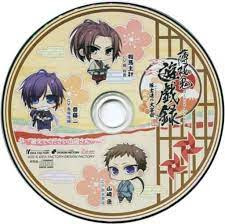
Ended up doing a bit more research that I would have liked to translate this since the names of the positions in the Shinsengumi’s organization for spies didn’t translate well from Japanese into Chinese (huzzah for google translate and for biographies that list names in Chinese and Japanese so I was able to find the information I was looking for in English)... Also, i didn’t look up the gameplay for anything since I had to uninstall KW and EB for space when I was taking things off my damaged passport, not that it would have made much of a difference since I can’t recall a point when the “Watch” was actually voiced... so I might not really be consistent with a few things in this translation since I only did research during the latter half of this...?
oh well. i don’t know Japanese and don’t do the editing for my subtitle videos until I compare everything to the audio later so I can claim ignorance. i suppose that’s an odd benefit of not understanding Japanese hahaha.
Anyway, as always, my translation not be 100% accurate since I translate from Chinese. final edits will probably take a bit longer (in comparison to the other things i’m still sitting on) to do since im still debating about what im do with all the Watch-related words since I really don’t like it when the things I translate aren’t consistent....
PERSONAL RECOMMENDATION: I HIGHLY ADVISE AGAINST READING THIS AND WAITING FOR MY SUBTITLE VIDEO.
Hakuoki Shinkai Yuugiroku, Please teach me, Yamazaki-san! Drama CD
Translation by KumoriYami
Yamazaki: (I think that since there haven't been any large manhunt operations lately [reword later? tl can also mean "to hunt and arrest"], things have been quiet.)
(However, what is that guy doing/is that guy's purpose?)
The one out there, I'm not going to run.
So come out and tell me why you're spying on me.
~wind blows~
(Not planning on coming out...?)
-grips sword-
Then, I'll take the imitative to attack.
(movement in bushes)
Souma: Ah, please wait a moment!
Yamazaki: Oh. You are... Souma-kun?
(movement in bushes again)
Saito: Sure enough, I was immediately found/discovered/I was detected immediately. As expected of Yamazaki.
Yamazaki: Based on just the breathing, I thought there was only one person, yet Saito-san was also still here. Exactly what are you doing?
Souma: Sorry! I didn't mean to do anything strange.
It's just that I wanted to observe Yamazaki-san work.
Yamazaki: Observe me work?
Although it's fine if you want to watch, but aren't you the Chief's page?
Saito: I recommended that he try this, But he was immediately found. Still it's better to ask the person himself directly.
Yamazaki: You two, what are you talking about?
Souma:...Um, Then, Yamazaki-san, please show me how to [/you] work!
----
Souma: Hakuoki Shinkai Yuugiroku, Store Bonus Drama CD, Please teach me, Yamazaki-san!
----
Yamazaki: In other words, you now understand the duties of a page, and still want to know what sort work the other warriors do, and want to try monitoring/surveillance/doing the Watch's work?
Is that how it is? Souma-kun.
Souma: It's just as you said.
As the chief's page, I work hard every day,
but I still don't know a lot about the Shinsengumi.
That's why I went and asked Saito-san [about this].
Saito: I know that Souma is working very hard. Though that will naturally be [more/become] obvious as time goes by/Though as time goes by, that will naturally be understood/Although this has been said for a while, this will naturally be understood. [check audio]
Yamazaki: But you don't want to wait for/until then, and want to be of use as quickly as possible?
Souma: Yes. Can you help me with this, even if it's [for] just a little bit?
Yamazaki: Hm.
Souma: Yamazaki-san.
Yamazaki: No, I was just reminiscing the past/thinking about the past.
I used to be as anxious as you are.
Alright, if I can, permit me to teach you.
Souma: Thank you very much!
Saito: Then can I also accompany/join you?
Yamazaki: Saito-san also wants to? That won't be a problem.
Saito: I also have experience following people while on patrol
I'm very interested in how the Watch [im pretty sure it's the Watch here and in the earlier instance. tho i can't say for certain since CN doesn't exactly do capitalization and ive never played the game in Chinese] fulfills its duties.
Please allow me to learn again. [check audio]
Yamazaki: In that case then, I'll ask you to please look after me.
----
Yamazaki: Although it normally referred to as the Watch,
the Watch is actually divided into two sections.
Souma: In terms of how it organized, sorry but please review it for me again.
Saito: The part of the organization for spies which acts by itself to gather external intelligence is called Shoshi shirabeyaku ken kansatsu*, and within that, those who are responsible for investigating/monitoring the conduct of [the/our?] members/the investigators whose duty is to supervise the conduct of/our members are known as the Kansatsugata**
* Shinsengumi's organizational post for investigating movements of the opponents and keeping the Shinsengumi members under control. (source: https://japanese-wiki-corpus.github.io/person/Kuwajiro%20OISHI.html)
** had to look this up on the Shinsengumi wiki.samurai-archives
Yamazaki, who holds both positions/is capable of accomplishing both duties, is at the core of the Kansatsugata.
Souma: Shoshi shirabeyaku and Kansatsugata...
After hearing this again, I really feel that Yamazaki-san is quite amazing.
Yamazaki: Uh, do-don't say that out loud. I'm not used to it.
Souma: But, monitoring/investigating/supervising the conduct of the other members...
Saito: It's to secretly investigate whether or not members are conducting themselves in a manner that is befitting as members of the the Shinsengumi, and whether or not they have done anything improper.
Souma: In other words/That is to say, that also includes my actions so far.
Yamazaki: At the moment, you have no problems [there are no problems with you?].
Souma: Is-Is that so...
Yamazaki: There are almost two hundred members.
Among them, there will be people who do not abide by the regulations, and those who clearly show their dissatisfaction/obviously dissatisfied or are treasonous/or even rebellious.
Souma: I see. Indeed there are people who obviously show that.
Saito: It these people incite trouble within the team, it would be very troublesome.
That's why the Kansatsugata are needed to investigate people like this.
Yamazaki: Having said that, the three of us have been quite noisy so it would be helpful if we quickly correct that here. Ah. The two of you, over there.
Saito: Say who is there [more like "name" i guess? probably more "identify who is over there" ]
Souma: That is... Nagakura-san? There are several other people [He's with some other people/several others].
Yamazaki: This is a rare opportunity to train one of the basic skills for spying/[needed] as a spy. I'll give you a demonstration. Afterwards, you'll eavesdrop on their conversation without being discovered.
Souma: Yes, I'll do my best.
--------
Saito: Almost 15 minutes have passed. But it's really bold for you to have come up with this practical training, Yamazaki.
Yamazaki: For his first time attempt at doing this, Nagakura-san is suitable [to practise with]. As long as one isn't murderous [being bloodthirsty? think of something later], he'll basically ignore you.
Saito: Nn.
If it was Souji, he would immediately draw his sword for a harsh/ruthless interrogation.
Yamazaki: No, Saito-san would do the same thing, and immediately get rid of your pursuer [not sure if this is in the "dispose of" sense though the tl i have can be translated that way lol].
Saito: Well, it doesn't feel good to be tested when I obviously haven't been disloyal.
Yamazaki: It's as you say, but this is my job.
Souma: AAAHHHHHH!!!!
Saito: Uh. [That’s] Souma. Why is he being hunted down [chased/pursued]?
Yamazaki: By whom/Who is it?
Ah, Okita-san, at this time?
(frantic steps)
Souma: Sorry! I didn't mean to do anything else!
This was just training for surveillance work!
(sword swung)
Souma: AAAHHH!!
Okita-san, please forgive me!
Saito: An unexpected situation.
Yamazaki: He needs help to get away/escape from that situation, he isn't his opponent at all/he's no match for him.
Saito: I'll figure out a way to deal with Souji. You escape with Souma/You take Souma and run away.
--------
Souma: Truly thank you for just now.
Okita-san was already behind me before I realized it
I really thought that I was going to die/I was dead.
Saito: Dying is a bit of an exaggeration.
But I'm certain he would have stabbed your neck with his sword and left you half-dead.
Yamazaki: I didn't expect Okita-san to be nearby, but there was way of knowing that you'd encounter him/but nothing can be done about meeting him [check audio].
Well then, change your mood for the next training [reword later]. The target is that room. Remain quiet from this point onward.
Souma: What's next?
Yamazaki: Take this letter and swap it with the letter in that room.
But, in the next room, there is someone you must not be detected by.
Saito: Training for intelligence work?
If this goes well, then it's possible that the other party won't even notice you.
Souma: That would be good, so it's just this letter?
Then, I'll be right back.
Yamazaki: Ah, be very careful.
---------
Yamazaki: He entered the room without any problems.
Saito: Ah. So, who is the person in the next room?
Yamazaki: Well, it shouldn't matter since that person is asleep during the day.
( door slides open, then frantic steps)
Souma: Saito-san, Yamazaki-san!
I'm sorry! I couldn't do it!
As soon as I entered the room, I felt that someone was staring at me through the door of the next room! There was also this creepy laughter/ing!
Saito: Laughter? The eyes staring at you, were they red? [i swear this is going to become fanart one day lol. for both the spying and souma talking about what happened]
Souma: Yes! they didn't look like human eyes at all!
(door slides open.... slow creaking footsteps)
Saito: Does that mean that one over there was...
Yamazaki: Ah, damn it! He's awake!
Saito: Yamazaki, you go first! I'll deal with this!
Yamazaki: Sorry! I'll leave the General Secretary [so... i don't really like the English localization translation of Sanan's position being a "colonel" so i looked up what it said on wikipedia and used that] to you!
Souma-kun, come here!
This training/Training ends here!
Souma: Eh, eeehhhhhhhh?!
Saito: I'm sorry that it was noisy while your rested [that this noise disturbed your rest?], this was as a result of...
--------
Souma: What the hell that just now...
Yamazaki + Saito: It was just your imagination.
Souma: Eh. But, "General Secretary" was clearly said...
Yamazaki + Saito: You imagined hearing it [tl is more "it was an illusion" and one that is heard... maybe "you're hearing things"?. kinda gave up on thinking about that right now. ]
Souma: Is, is that so... uh. That being said...
Saito: What's wrong/What is it?
Souma: Although the Kansatsugata feels quite unremarkable, each individual/everyone posses outstanding abilities, and I've been made aware of that again. [However] I 'm incapable of doing this sort of work.
Yamazaki: Hm. It can be said that you're not talented at this.
Souma: Eh?
Yamazaki: In the first place, not everyone can do this.
All of us within the Kansatsugata are constantly working on improving our skills.
We're always fighting in the shadows for the Shinsengumi.
What you think of being outstanding abilities is the results of our hard work.
[remarkable capabilities?]
Souma: Truly, Yamazaki-san is amazing. I understand why everyone trusts you!
Yamazaki: Th-That's why you shouldn't look at me like that. But for you, I think that you're better suited to doing honest work [tl can basically mean "honourable," "not devious" or "out in the open" in the straightforward sense] and not this secret monitoring work/surveillance in the shadows [reword later].
Saito: Indeed, compared to secretly taking covert actions in the shadows, you are better suited at working in the open, Souma.
Souma: I-is that so...
Thank you very much for this/that.
If it's possible, I hope to still learn some things from you.
Yamazaki: There will be opportunities for that. Then, we'll end today's training here. Souma-kun, is there/do you have anything else you want to ask?
Souma: [Something] I want to ask....
ah. then, Yamazaki-san, may I ask you one last question?
Yamazaki: Ah, if I can answer, I won't hold back [will/do so].
Souma: What sort of technique is the "Tatami flip"?
Yamazaki: Ta... Where did you hear that name from?
Souma: Just now during this investigator training/spy training, Nagakura-san mentioned it/Nagakura-san mentioned it while doing the operative training. It is said that it is Yamazaki-san's most powerful technique.
Yamazaki: That guy said something unnecessary! No, Souma-kun, that's.... It's not something amazing like a secret technique..
Saito: Why are you being modest? That move is indeed capable of being referred to as/called a secret technique. If it's possible, I'll ask you to please teach me it. Perhaps I will be able to apply it to kenjutsu.
Yamazaki: Even Saito-san, what are you saying? [Even Saito-san is saying this? check audio]
Souma: Please, Yamazaki-san!
Saito: I'll be requesting the same of you, Yamazaki. [tl is more "i'm also requesting (you) to do so/asking"]
Yamazaki: Bo-Both of you, please raise your heads. I-I get it! I'll teach you.
Souma: Really?! Thank you very much!
Yamazaki: But, you can't tell anyone else about this.
Saito: Nn. Understood.
Yamazaki: Then, please get behind me. Aoyi***, Tatami flip!
This is the literal Mandarin pronunciation of the tl without tones. CN tl can mean “profound argumentation” (in Chinese), tho it's also used to refer to some of the highest level of martial skills in JP (so says a baidu search on the term).
The English google translate of that page puts this phrase as "Ogi," and after reading this page that mentions "ogi" (http://www.aikiweb.com/forums/archive/index.php/t-9948.html#:~:text=Yielding%20is%20called%20%22ju%22%20as,an%20open%20heart%20without%20ego.), so i will probably change this to either "Secret move" or "hidden technique" based on what it mentioned there
Souma: Uoh!
Yaamzaki: Ju-Just now, that was the Tatami flip.
Souma: Amazing, that was amazing, Yamazaki-san! How were you able to do that without any tools [check audio]? Please tell me how to do this!
Saito: This can be used indoors while fighting defensively/can be used as a defence when fighting indoors. It can also be used to hinder an enemy's movements.
Yamazaki: Yes. This requires focusing your strength into the centre of your palm, and within a single breath, smack/slap the edge of the tatami, and then lifting it up when the edge bounces.
Souma: So it's like that? Hoh.... tatami flip! Uh. Areh? It didn't bounce at all.
Yamazaki: Haha. It's not something you can master right away. It also took me a long time to do it. Concentrate/Focus a bit more strength into the palm of your hand.
Souma: Ha! Ah! Yah! It-It's not moving...
Saito: Practise makes perfect./Won't practise make perfect [check audio]? Alright, I will challenge this. Should the position of my hand be around here?
Yamazaki: Yes. [Though] It's better to have it moved a bit forward [moved up a bit]/ if the if the center of gravity is moved forward.
Saito: Understood. Then, I'll be going.
Secret technique: Tatami flip!
Yamazaki: No way...
Souma: Uoh.
Saito: Nn. That happened naturally [reword later...? tl is is basically "letting nature take its course was achieved"] .
Souma: Sa-Saito-san, that was amazing! You actually succeeded in one go!
Saito: No, there's no guarantee that this will succeed every time. The accuracy and speed can be further improved upon.
Souma: Really, the Shinsengumi has assembled some amazing people. I can't fall behind and have to work even harder.
Saito: Ah , work hard. I am always willing to practise kenjutsu with you.
Yamazaki: Ah, but, to have it actually done it so easily, my confidence...
Saito: What is it, Yamazaki?
Yamazaki: No, I just feel that need to train a lot more. Let's improve together, Souma-kun.
Souma: Yes! Please look after me!
Souma Kazue, Kaji Yūki
Saito Hajime, Toriumi Kōsuke
Yamazaki Susumu, Suzuki Takayuki
-end-
sorry but this is the only souma thing i have scheduled for april.
also i wanted some Yamazaki content translated, but i unfortunately don’t remember if i ever found Yamazaki’s route from Yuugiroku 2... so I settled on translating what I hope is a certain complete chapter (as viewed via the extras menu) of Souji’s route with him in it... sorta. scheduled for july!
--------
image from suruga-ya
#hakuoki#hakuouki#hakuoki yuugiroku 3#hakuoki drama cd#hakuoki drama translation#Saito Hajime#Yamazaki Susumu#souma kazue
31 notes
·
View notes
Text
Improving Your Writing when English Isn’t Your First Language (mega-ask)




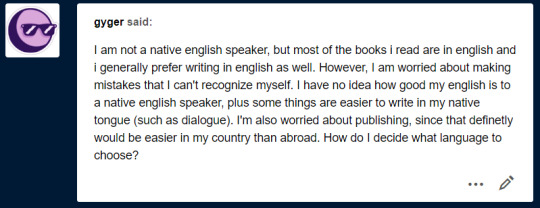
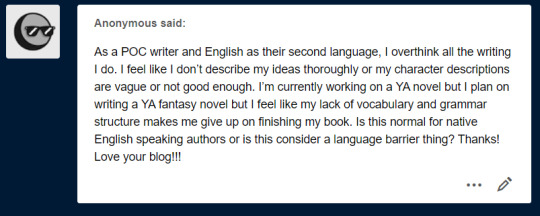

As you can see above, we've gotten more than one question about writing, improving your writing, and even publishing in English when it's not your native language. First off: that's awesome. To anyone writing or even consuming in a language that's not your first, kudos to you.
You can google any variation of this question and get different articles with a ton of the same advice, and some with conflicting advice. Not only have I compiled the most commonly repeated information, but I've also reached out to people on our Discord server and others for their personal experiences.
I'll start off by listing concise versions of the advice and then expound on them further on in the article. Remember that we are not experts on your writing and that everyone learns in different ways and at different paces. These are in no particular order.
-be patient
-practice
-get feedback from native sources
-don't undermine yourself to your audience
-Grammarly
-research
-don't get discouraged
Be patient
That's first because, well, duh. Patience is so important for both yourself and your writing. Writing is hard enough of a passion without the added difficulty of doing it in a language that doesn't come naturally. In the world of literature, writing/publishing in your non-native language isn't just a matter of translating words. It requires translating of ideas, concepts, and even cultural norms, which is why just slapping it into Google translate won't work.
Part of the reason for the advice of having patience, too, is that writing in your native language needs to take time. It doesn't really matter how fast you can whip out 20 pages of a first draft--it'll still be a simple first draft. Writing is a craft that requires not just love and passion but time. So what if you need a little bit of extra time--or a lot of extra time--because you're accomplishing a feat most don't even think about attempting?
Next is to practice.
That goes hand in hand with what I said about being patient. Again, writing in and of itself is all about practice and doing it daily (not that I'm an expert on getting that done, but you know). But when it comes to practice another language, there are different ways you can do that. You can reach out to native speakers (for English, there are going to be so many people willing to help, even just in our community! you just need to ask) and practice having conversations or ask them to look over your work. Practice by turning on your favorite movie or TV show in English with subtitles in your native language. Watch videos on YouTube, find a Spotify playlist/podcast, in your target language. There's also plenty of people who have done what you're trying to do who have shared their experiences and what helped them on those same platforms.
Get feedback from native speakers
This is a bit of an expansion on what I mentioned in the previous paragraph. In my experience, and from what others have shared, writing in a non-native language can be pretty clinical. Writing with figurative language or in metaphors won't be as easy or come as naturally as it does in your own language. Things like idioms and even pop cultures reference aren't always going to translate even if you have the exact words. That's where native speakers come into play. If they're willing to look over your work, whether as a friend or in an editorial position, they can give you advice about whether the wording in one spot sounds clunky or if a phrase doesn't make sense or if there're synonyms for what you already used to help convey your message even stronger.
Don't undermine yourself
This is something that I personally am saying. It's not mentioned on any of the linked sites, and no one I talked to said it. But as someone who is a native English speaker (and even has a degree in it) I think this is super important. This point goes towards native English speakers/writers, too. Don't undersell yourself and undermine your work to the audience before they have even picked it up. Disclaimers are different, and it all comes down to the words you use and how you use them. Let your readers know, whether it's people on AO3 or a literary agent, that English isn't your first language. Let them know concisely that they may find some basic errors--but stop there. Don't grovel. You have nothing to apologize for, especially once you've given that warning (those is it really a warning? what's so dangerous or scary about a few mistakes?). You're writing is not going to be any less of an accomplishment for a few grammatical errors, or mistranslated phrases, or even typos. I've seen so many mistakes in published works that it's kind of ridiculous. But if you put something out there for someone to read and in the same breath say "I don't know that this is worth reading" I'm going to need extra convincing to pick it up. *kicks soapbox away*
Grammarly
*NOT sponsored*
Grammarly is a wonderful tool that you can use, for FREE. It not only (with the free version) helps correct spelling and grammar, but can also help point out the tone you're writing with. For example, right now, Grammarly is telling me that this writing sounds mostly informative--which it's meant to be--and a little appreciative and friendly. When sending emails I've had it tell me that it sounds formal (which I was going for), and I've also had it not say anything because the text was a different kind of writing (like when I'm proof-reading something being posting it on AO3...). I honestly don't know what else it helps with once you've paid because I've been happily using the free version for about 3 years now.
Research
Don't be afraid to pick up a book, or head to the library, or pull up Google. Research is paramount to writing anyway, let alone once you're doing it in another language. Your research options are limitless and can include your mutuals on social media as well as those dictionaries that translate from one language into another. Research can also include (in my humble opinion) binge-watching/reading your favorite things...in English. In four years of university, one of the most frequently said things was to improve your writing 1) write every day and 2) read every day. You're never going to learn from worrying or overthinking, and you're also never going to learn from just doing DuoLingo (that's more conversational than literary anyway).
Something a member of Discord specifically said in relation to research was to look at morphology, at the roots of words (and root words). Morphology is, in linguistics, looking at how words are formed. For example, let's look at "biology". There are parts to this word that each has a different meaning, that formed together created a new/elevated meaning. "ology" means the study of something, and bio means life. So biology is, simply, the study of life. Once you've got those basics of things like "ology" under your belt it'll become easier to not just translate words but the concepts (if this works with your learning style).
Last but not least, don't get discouraged.
Writers of all kinds get discouraged when writing in their native language. Even those of us who speak English as our first language make mistakes worth discouragement (you will never know how many typos were corrected by Grammarly as I wrote this all out the first time). English is not an easy language. It's not the hardest, but it's far from easy (learning another language isn't easy regardless of what languages are involved). This is a post from someone who is a non-native English speaker but you would never know unless they told us.
While researching for this, I found some articles/blog posts that said mostly the same thing, and are where I got some of the information
This one is from a native English speaker giving advice
This one is for writing for non-native English readers, but still has good advice
And finally this one is a blog post (I think) from someone who is a non-native English speaker!
In specific response to some of the asks:
English, like any other language, changes. It's a very dynamic language, actually, and from region to region, there will not only be different accents but different frames of reference. 1950 isn't so far back in time for the English to be drastically different from what is spoken today, but I'm in the USA and you're asking about Oxford. English in England has very different nuances, even more so than you would get between California and Texas and New York. This is a link to the Oxford English Dictionary list of words that became more common in the 50s. However, this is a generalized list, not specific to any English-speaking country let alone region or city. If you're wanting to look at how to convey the accent of people from/in Oxford, there are videos on YouTube of people speaking in different accents so that you can have an idea, a comparison, at least in your own mind. With the 50s it's going to be more just thinking really of what words and lifestyles and things weren't around yet; cell phones didn't exist yet. Here's another link to some stock images of Oxford in the 50s. Remember, this time was very close to WWII so there'll be lingering effects of that, especially in England.
About fight scenes and curses, there's a ton of resources on that. If you just search "fight" on our page, you'll get a ton of posts answering that question. Also, here's a link to a superb and excellent source on writing fight scenes. When it comes to curses...just watch Rage Quit on YouTube, or spend a while on TikTok. If you want to dive right in just Google "English curses" and there'll be YouTube videos, entries on Urban Dictionary, you name it.
When it comes to publishing, once you've gotten your manuscript is a perfect time to have a native-speaking friend look it over. Whether editing is their thing or not, they'll be able to help with the things that are really obvious. I don't have any experience publishing in a different language, though, so there might be other resources along the different stages to help you. Some general publishing advice I've gotten: when wanting to publish fiction, literature, start small. Start with short stories in literary journals, online and in print. You really can't make much headway with large publishing houses without a literary agent and it'll be easier to attract one if you have evidence that you can write, and write well enough people want to read it. When it comes to poetry, just start submitting. Get familiar with the process, and educate yourself on things like simultaneous submissions and a good rejection. Publishing is an ever-changing game that isn't cut and dry in any language or country. We can't tell you what's best, but my advice is to go with your gut and try your best. Don't be afraid to try again, too.
Everyone overthinks their writing. Or at least, everyone I know who writes does. Honestly, in my opinion, if you're not overthinking at least a little bit, you're not worried enough. You will never be able to fully know whether you've explained or described enough. A good chunk of the experience is up to the readers, so you have to leave them some wiggle room for imagination. But that doesn't mean you have to cheapen your story or short-change your characters. You mention specifically that you're POC, which I'm gonna guess also means that your characters will be POC. It's never too much to specify the race/ethnicity of your characters, even in a fantasy work. How you go about writing those descriptions might need to change but it's kind of like chocolate chips, in my mind: you decide those things with your soul.
So, there you have it. A ridiculously long way to say: you're awesome, you do you, practice, love yourself and your writing, and don't be afraid to put yourself out there (in any way).
(images read:
Anonymous said: Im writing a book based in Oxford in 1950s. how was the language different from now. I am not from an English speaking country at all. Never been outside my country either. And Im going to write a book based in England in English
Anonymous said: Hi there, I’m a writer for almost 3 years now but since English isn’t my first language I get discouraged easily if things I write come off strange to myself. Do you maybe have any advice for me, on how to motivate myself and not comparing myself with native English speakers? Thank you in advance!
Anonymous said: Hello! I starting to work on this shortfic but it’s been really hard. It’s like I’m trying to building a house alone and with my bare hands. Even though I’m already used to write in mother tongue. Any advice for non-english speaker trying to write their first story in English?
Yaelburstine said: Hi. Do you have any tips about how to write a good fight scene and curses that people speak English get cus’ it’s not my first language
gyger said: I am not a native english speaker, but most of the books I read are in english and I generally prefer writing in english as well. However, I am worried about making mistakes that I can’t recognize myself. I have no idea how good my english is to a native english speaker, plus some things are easier to write in my native tongue (such as dialogue). I’m also worried about publishing, since that definitely would be easier in my country than abroad. How do I decide what language to choose?
Anonymous said: As a POC writer and English as their second language, I overthink all the writing I do. I feel like I don’t describe my ideas thoroughly or my character descriptions are vague or not good enough. I’m currently working on a YA novel but I plan on writing a YA fantasy novel but I feel like my lack of vocabulary and grammar structure makes me give up on finishing my book. Is this normal for native English speaking authors or is this considered a language barrier thing? Thanks! Love your blog!
Thank you for your questions, and for your patience as we do our best to answer them.
-S
204 notes
·
View notes
Text
Queering KH Part 4: Hearts in Tune
Actually KH Finally lol

Pictured: Riku humming Sora’s name in a soft, adoring, wistful voice the way a swooning straight person sighs the name of their beloved of the opposite gender.
Kingdom Hearts gives off so many subtextual signals of queer coding that it genuinely BAFFLES me how people can really believe it is straight. You may be wondering what makes me so confident in that when there has not been anything in the games to explicitly prove any of the characters are not straight, and I will be happy to tell you. It is because in order to believe Kingdom Hearts is straight, you have to ignore WAY too much subtext. To truly believe that Sora is in love with Kairi and only coded to be interested in Kairi, you have to ignore his questioning of what love is. You have to ignore the combined keyblade he shares with Riku. You have to ignore how much the narrative is driving him to understand that Riku is his most important, cherished person. This all goes doubly for Riku who has a coming out story not unlike Elsa’s metaphorical one, in which his love for Sora is his greatest source of strength. You have to pretend the necklace gifting plot point is entirely straight and cannot possibly mean anything homoromantic. You have to ignore the way Sora cries while clutching Riku’s hand compared to his subdued and non-emotional reunion with Kairi- that’s just too much “accidental subtext” for me to confidently ignore lol. Intentional or not, KH is Gay~
Here’s how we’re gonna do this.
So where the hell do I even begin with coding KH? Well- I can’t possibly queer the whole of KH text in 1 summer, so what I plan to do is this:
Give you the tools to understand KH’s coding so that you can code it yourself~
Queer a few major KH scenes so that everyone can see that the proof is in the pudding.
I’m gonna try to break down various scenes to decode them and queer them so you can see what’s at play in KH. Originally when this meta was a single doc, I was only gonna cover 4 scenes. But since I’m breaking it into parts to update at my leisure, I’m gonna just add scenes and meta as I go~
Now without further ado:
How the Hearts in Tune scene is Gay Coded
This shouldn’t be too hard at all.~

This scene is almost too easy.
The scene opens with Sora bringing Mickey the sound idea he found but as it turns out, one sound idea is not enough. Sora tells us not to worry because he has a friend who is always picking up the slack for him. Likewise, on Riku’s end, he brings his sound idea to Mickey and is surprised to see that Sora’s sound idea is necessary to complete the song.
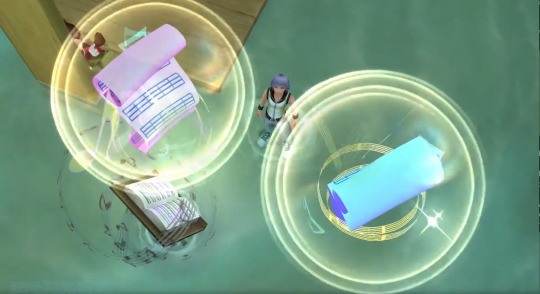
Once the sound ideas meet, this beautiful visual plays out in which the 2 sound ideas swirl around each other and the soundtrack title “Dearly Beloved” plays.
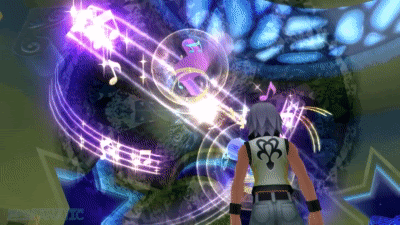
Now, there are several things I want to note about this sequence- heck this visual alone before we move on.
Recall earlier when I discussed Shiki’s point that blue and pink (likewise blue and red) “go together”, romantically.
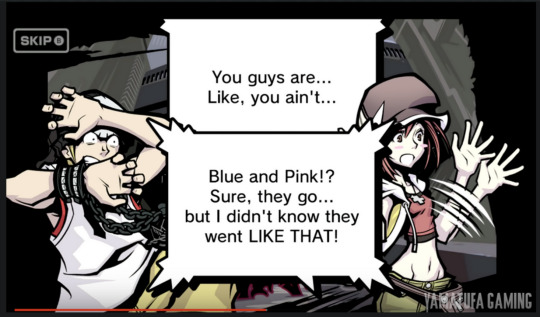
I will let the visual of Sora’s sheet music being pink while Riku’s is blue speak for itself. But I will also add how this ties into the yin and yang themes I’m about to discuss:
Yin and Yang
This concept gets its own section because it’s such an influential concept in so many aspects of various cultures around the globe.
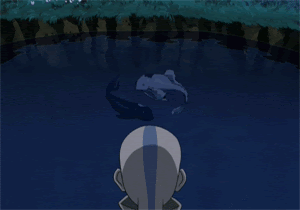
Yin and Yang is an eastern philosophy which illustrates the concept of dualism. In short, it is the concept that 2 opposite halves are complements to a whole. The original term in fact translates to dark-bright.
I am neither a philosophy professor or student so I will keep this as brief as I can and simply encourage you to study up on Yin and Yang at your own leisure. I will however paste this section from wikipedia because I think it is extremely helpful information to have for studying eastern media in general.
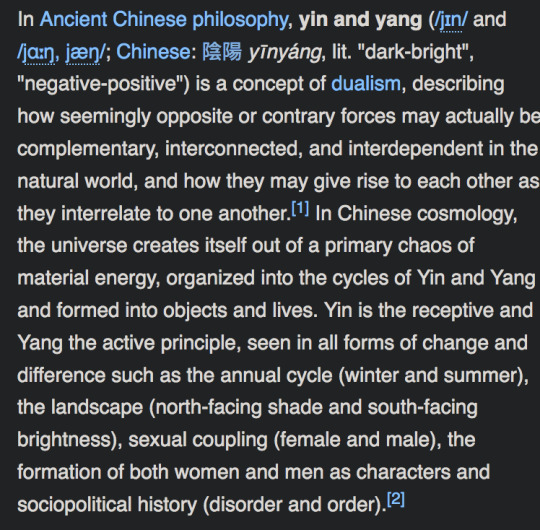
Yin and Yang: husbanded opposing forces. Dark-Light, Moon-Sun, Chaos-Order, Winter-Summer, Negative-Positive.
Female (Yin)-Male (Yang): Yes this is often used in a heteronormative heterosexual context because people are homophobic and believe in gender binaries, unfortunately, but I implore you to consider the concept in more figurative, spiritual, aesthetic themes, especially since Yin and Yang is a much grander philosophy than mere sexuality discourse; it’s about complementary forces creating a whole.
For shipping purposes, think opposites attract. Think concepts that are traditionally associated with femininity meshing with concepts that are traditionally associated with masculinity. Queer media has a wonderful way of subverting heteronormative Yin and Yang tropes by showing that cis-hetero standards can be hypocritically non-compliant with the complementary concept.
Rather than thinking of this, 2 heteros in love based on being just- the same person with opposite genders:
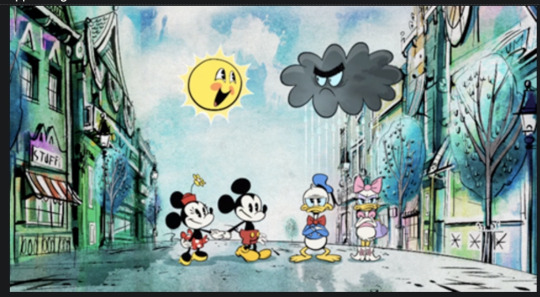

Think of this, same gendered couples with complementary personalities:
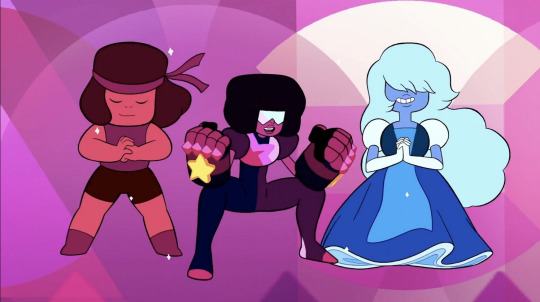

Think about how an aloof scrappy butchy vampire queen attracts an uptight calculating femme princess.

Think about how this goody-goody dumb jock with a martyring hero complex attracts this naughty cunning jock with a self-loathing villaness complex.
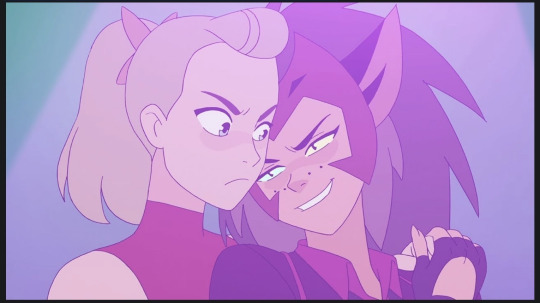
And now think about how badly we need more canonical mlm couples in children’s media lol. Oops my finger slipped. But I’m getting ahead of myself lol.
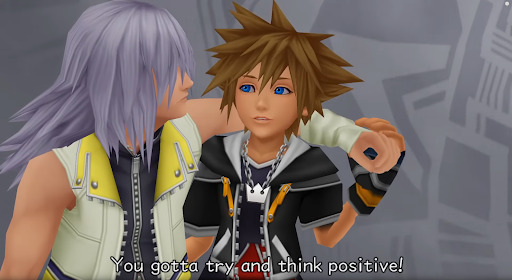
The concepts of interconnected opposite forces are so important and prominent in literature throughout the world, but yin and yang is ESPECIALLY important in Kingdom Hearts because it is a story that explicitly explores Light and Dark forces. It explores how they both oppose one another in catastrophic ways,
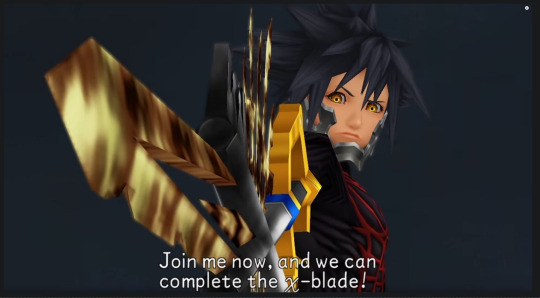
and how they complement each other in harmonious ways.

Getting ahead of myself again… But hey speaking of harmony, back to the matter at hand.
Hearts in Tune.

This scene shows a number of romantic symbols. As I was saying before the yin and yang tangent, pink and blue (nee red and blue) are already symbols of romantic suggestion. And in the case of them representing 2 parts of a whole song, these song pieces act as complementary halves, adding another layer of dualism to the scene. Furthermore, the music sheets swirl around each other in a yin and yang fashion. Harmony has been achieved. This lets us know these forces belong together. These forces representing Sora and Riku. They are husbanded together. These 2 hearts in question are part of each other. In fact, Mickey even says so:
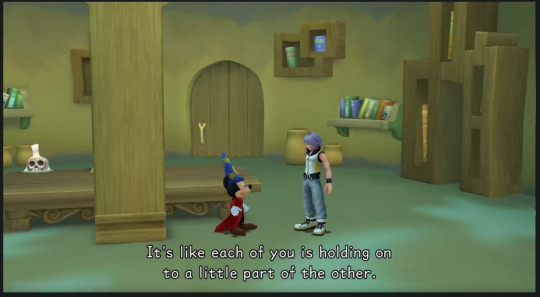
Perhaps most damning, however, is that the song in question is “Dearly Beloved”, arguably the theme song for Kingdom Hearts as far as the score goes. I’m sure it goes without say that “Dearly Beloved” is not only in itself a romantic sounding phrase but it is also the phrase specifically said by officiators of weddings to the congregation before the wedding vows are exchanged. “Dearly Beloved, we are gathered here today…”
I will also mention that Riku’s dream eater symbol visible in the shot is specifically designed based on a bleeding heart flower, a symbol of passionate love. Credit to Steam for pointing this out here, please follow them and read their posts they are magically delicious:

So almost everything about this scene is aesthetically romantically coded, and I didn’t even mention the fact that Dream Drop Distance’s whole color palette is themed with rainbows, which as I said earlier is absolutely still a gay symbol in Japan. Note the rainbow of colors animating from the sheet music.

So in terms of the atmosphere of the scene, its already incredibly homoromantic in every way I can think of. But what about the dialogue?
Well lets talk about the dialogue. Dialogue should always been read with care when you’re trying to queer a text. Often a lot of queer messaging in a text is subtextual. This means the text itself may actually say something gay, but you have to read further into it. This is an old method of queer writing designed to protect the writer from getting in trouble for their gay crimes.
Historical aside on this: If you’ve ever read Oscar Wilde’s “The Picture of Dorian Gray”, you may have note that Lord Henry can never just simply say that he is gay, lest Oscar Wilde be charged for homosexuality in 19th century England. Instead, Lord Henry simply tells us he is married to a woman, but makes it clear throughout the text that this marriage is mostly performative and he is not emotionally invested in it whatsoever, going against the puritanical, heternormative ideals of Victorian prudery. Lord Henry is by contrast MUCH more invested in following the life and times of his very close friend Dorian Gray, with whom he shares a hedonistic philosophy in the name of Fin de siècle. Not to be a downer but for the sake of understanding how real this subject of oppressed gay censorship is, despite keeping the homosexual themes as purely subtext, Oscar Wilde was tried and convicted of homosexuality and this book was used against him in court.
What we are privileged to have today with KH is a cutscene and not just a script. Meaning we have visuals, animation, voice acting, musical cues, etc etc to follow along with to enhance our subtext.
On Sora’s end of the conversation, Mickey points out that the song is incomplete with just his sound idea alone, and Sora tells him not to worry, as Riku is his dependable friend who will fill in where he fails. The text in the official English translation is:
Mickey: That's strange... Is one Sound Idea not enough?
Sora: Don't worry. I've got a friend out there who will help. He's always
picking up the slack for me.
This on its own sounds platonic. But note just how affectionate Sora’s voice acting is when he says it. Not only that, he clutches his heart to let us know how close he is to Riku and how much his connection with Riku matters to him. How much confidence he has in this friend he cares so much about. He then closes his eyes after saying it, smiling up in the air blissfully while he waits for their hearts to make their connection and finish the song.
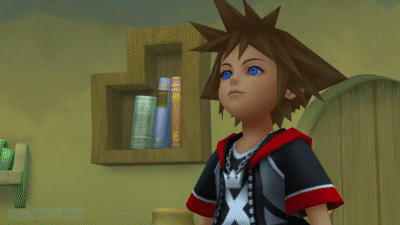
Once it is finished, Mickey remarks that their sounds joined together to make something more powerful. Sora then says looking thoughtful, “Yeah. Two forces are better than one. Right, Riku?”

Following this, Sora leaves to fight the boss.
On Riku’s side, Mickey questions what happened, and Riku looks up thoughtfully, and says tenderly, “Sora.”

Mickey comments “Sora? Funny... Just hearing that name kinda makes me wanna smile.” and Riku tells him warmly, “Yeah. That's how he is.”
Mickey then goes on to say some really shippy stuff:
“Whaddaya know... Riku and Sora. The Sound Ideas you two set free joined together. And when they did, they made a great and powerful harmony.”
Riku then nods and tells Mickey brightly that “Sora can find the brightest part of anything, and pull off miracles like there's nothing to it. It's pretty hard not to smile around him.”
And I would like to pause to look at that line. “It’s pretty hard not to smile around him.” Although Mickey says the same thing, that just hearing Sora’s name invokes a smile, we sense a somewhat deeper meaning in Riku saying it. Why is that? Well, for one thing this game is entirely about Riku protecting Sora and exploring how much Sora actually means to him. This game is continuing Riku’s redemption arc from KH2, but it is also doing something perhaps even more important: it is providing him a journey of self discovery. This test resets Sora and Riku to level 1 so to speak, not just in their powers but even their models revert to variations of their KH1 selves. This helps to underscore Riku re-examining himself and his feelings.
And then guess what? Mickey makes some even SHIPPIER commentary. He exclaims “Wow! No wonder the music sounded like so much fun. But I bet he's got you to thank for that. Having such a good friend means he could really enjoy it.”
Riku is taken aback by this comment. “Huh?”
Mickey continues, expressing some extremely yin and yang themed sentiments,
“It's like each of you is holding on to a little part of the other. Your hearts are always in tune, so they're free to sing. Gosh, I hope I can be part of the team someday.”
Mickey did us a wonderful favor and expressed to us explicitly, for those who didn’t understand the romantic coding of the scene already, that Sora and Riku are a good match. Mickey tells Riku that the music sounded like fun in English, that it was a happy, pleasurable time, and tells him that Sora has Riku for a friend which is what must have made it so enjoyable.
So from this dialogue we get assurance that Sora and Riku are two very close friends, whose hearts are connected, and they are 2 powerful forces that merge into an even greater one. Their hearts are in tune.
Now if this were a scene about a boy and a girl, I doubt anyone would question whether it was romantic. Why should we be asked to look at it platonically just because it is 2 boys? The romantic imagery is clear.
And let me ask you this while we’re still on the subject of Dream Drop Distance:
According to Riku’s character files, he had previously thought of Sora as a little brother, and tried to be a cool older brother to him.
He then tells us that this has changed. What did it change to?
The surface level, heteronormative answer would say it changed to them being merely friends.
But isn’t that an odd regression? After all, found family is a thing, and that’s a bit weird for him to question since there is no reason for those feelings to change on that notion. If Sora loved him like a brother, that clearly hasn’t changed. Riku clearly loves Sora as deeply, so that didn’t change. The other problem with this phenomenon Riku is dealing with is that there is no reason for him to feel this strange sense of repression we keep seeing over this change. He is constantly holding back on some feelings for Sora but platonic and brotherly feelings are entirely acceptable. What is it that he is hiding? What sort of feelings for Sora would be hidden?
From the Kh2 Novel:
He really did want to see Sora and talk. But that was impossible with this appearance. The things that mattered the most were what he couldn’t tell Sora. It had always been that way.
What sort of feelings might be systemically oppressed?

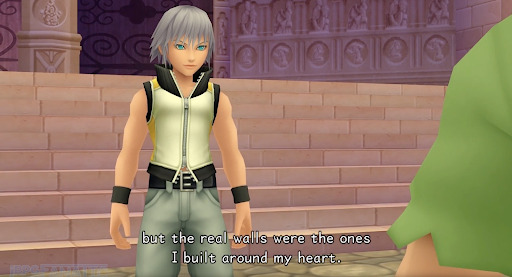
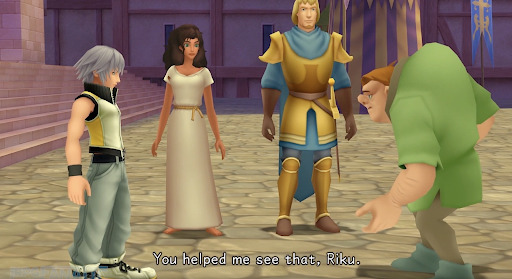
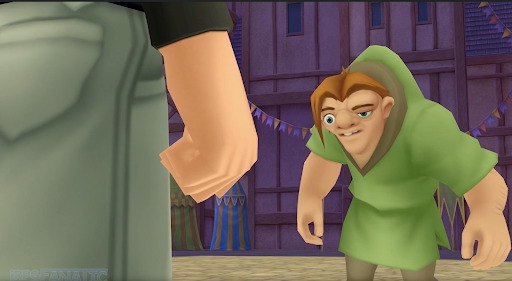
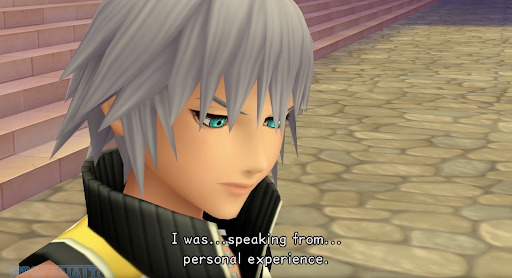
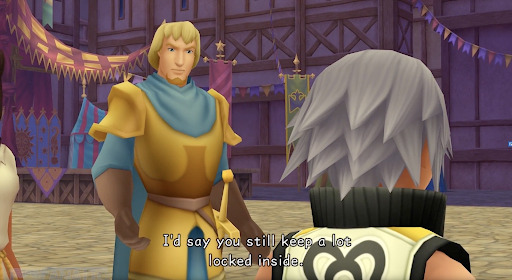
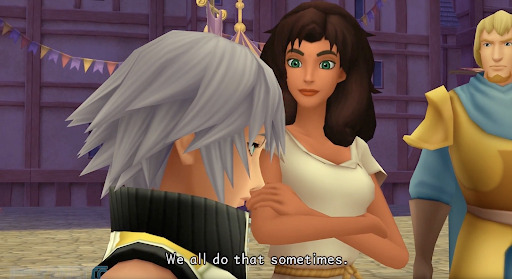
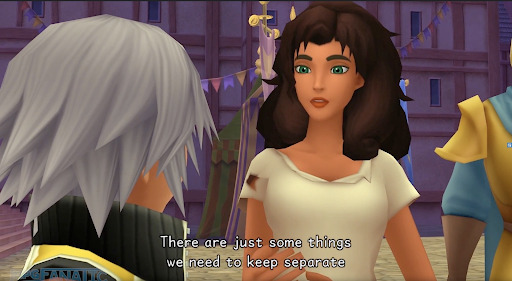
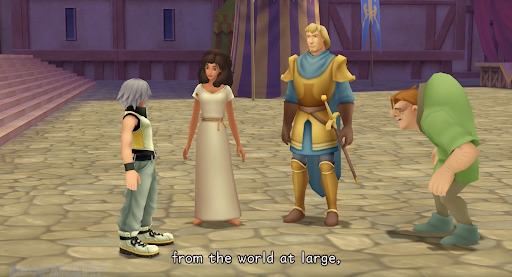
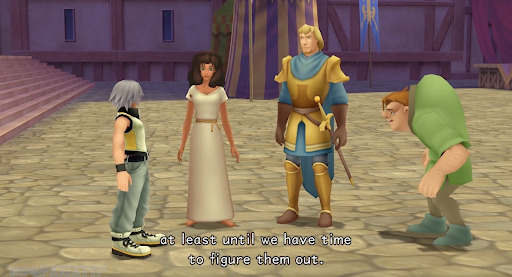
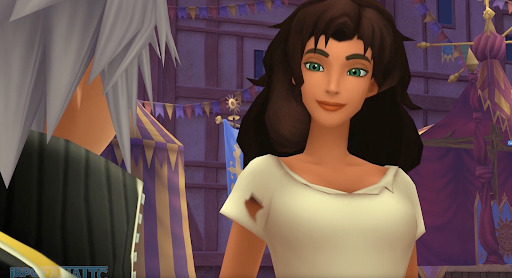

This scene is pretty much EXACTLY what I would do to say as explicitly as possible that Riku is gay without being able to say it outright due to censorship.
73 notes
·
View notes
Note
Do you mind if i ask you how you language study? I’m so unmotivated and unstructured right now 😭
Hi! I am always open to questions. I hope you don’t mind but I am going to answer this publicly, just incase there is anyone else who wants the same advice. Also please keep in mind I am not a professional and I am very much still a beginner and still making mistakes within my language learning but that’s all part of the process. I’ve split my answer into two sections to hopefully make it easier to understand. I’ll also be making videos on my YouTube channel in the future about language learning so those may help too.
I think a large bulk of the learning comes down to two things: resources and habits. And these will be different for everyone because it will depend on the language you want to study or what outcome you are looking for. I am learning German and looking to be fluent, so my answers will mention that but obviously you can apply these to any language.
Resources:
I use Duolingo as a way of learning languages. Obviously you can use whatever language app works for you. I think Duolingo is good for new vocabulary and phrases. It does lack a conversational element but in order to get the basics of what you’ll need, Duolingo can do that. (I’ll be making a video about how I use Duolingo specifically because I know people have their own ways but I’ve found something that really works for me personally and might help others) Something I do however, is I only learn new things Mon-Fri and I practice what I learnt in the week, or have a break if needed, on the weekend.
You’ll probably want to find other sources to learn too, so another good one is youtube channels that TEACH the language you want to learn. If you type into youtube ‘learn _____’ then videos teaching your target language should come up, especially if it’s a ‘popular’ language. This will also give you another perspective to learn the vocabulary and phrases.
You can also search for, and watch, YouTubers who are native (or speak) the language you are learning. These could be random content or people who specifically talk about learning your particular language. I follow both. This allows you to experience the language in a more casual environment, something helpful especially if you aren’t exposed to your target language everyday, like me. No one I know speaks German.
Books will also be a big help. Again you will want to look into many varieties. Both academic and for pleasure. So you can buy ‘textbooks’ in your target language that explain to you (in your native language) the rules and vocabulary for you to learn. And then also buy books you have read and enjoyed (a popular one is Harry Potter - which i’ve never read) and then read the book in your target language with the English (or your native language) copy alongside it so you can translate parts you can’t work out. This will help you pick up full sentences and vocabulary that an app like Duolingo won’t teach you.
One that I started recently and I LOVE!!!!! is listening to my target language in my sleep. Not only is it relaxing but it’s a way of practicing without practicing. They say a good time to learn anything is when you are relaxed and you’re never more relaxed than in bed. It also means that my target language is the final thing I am hearing before I go to sleep. Another good one once you are picking up vocabulary, even if it’s just single words, is to say them to yourself in the bath/shower. Another time when you are really relaxed.
Habits:
I try to study at the same time everyday, which for me is 3pm. It just gives you that little bit of routine with learning, instead of trying to find random times in the day where you can cram in learning. Consistency is key and a routine will help.
I also try to dedicate at least 30 minutes for learning new things. Practices can be anything from 15 minutes.
Write notes (again I’ll be making a video about this soon)... notes don’t have to be fancy or perfect. Just do you. The things I write are either things I don’t understand/am having trouble getting my head around so could use more practice or things I think will be really helpful to me and I would use all the time.
Speak as much of your target language as you possibly can. At first that will be very basic things but the more you learn the more you’ll be able to say out loud. Also when learning, say everything you read out loud. Reading a language in your head is very different to actually saying it, and this will help with pronunciation.
You can make your own resources, again these don’t have to be fancy or perfect. A good one is flashcards. These are really simple. Write your target language on one side and your native language on the other. And then the more you practice them and the more you know, you can start removing the flashcards that you know instantly, as you don’t need to practice them anymore. But keep them in a separate pile and every once in a while just look over them to make sure you aren’t completely forgetting them. But eventually, you’ll get to a point where certain words, sentences, phrases, will just come to your head naturally.
PRACTICE!!!!! - I do practice sessions every morning when I first wake up. And I like to do them on Duolingo (it gives you a practice option) and this is good, because Duolingo will pick the topics for you rather than you picking them. So it will be random selections of what you’ve been learning. This stops you from constantly practicing the same thing and also stops the habit of practicing things you know because you are scared to practice something you aren’t as good at. These practices don’t have to be long - 15 minutes!
These are what I do and I find they work for me but obviously adapt them to your own way of learning if something doesn’t work for you specifically. And something to remember is everyone goes at their own pace and it is not a race. Work at YOUR pace! I was very discouraged thinking I was going too slow but now I know the pace I work at is good for me.
Please let me know if there is anything else you want to know or if anything was unclear. And good luck with your language learning!
#mine#response#reply#ask#langblr#langugae#langues#language blog#german langblr#deutsch#deutsch langlbr#study#studying#studyblr#studyspo#learning#motivation#routine#procrastination#study schedule
46 notes
·
View notes
Text
Even Heroes Have the Right to Dream: Chapter 4
You took for granted all the times I never let you down.
First, Previous, Next.
Ao3.
Story under read-more.
“Jon? Can I bother you for a second?”
Jon looks up from his assignment to Marinette. Honestly, it’s a bit of a relief to take a break from it. “Sure.” He says. “What do you need?”
“I’m planning to call Alya, soon. You know who she is, right?”
“Your best friend, right? Through a lot of grade school, I think you said. Is she the one that wants to be a reporter?”
“Yeah. She’s been bugging me to meet you, recently, so I was just wondering if you’d pop in to say hi for a bit.”
Jon smiles. “I get to meet your Paris friends? Cool. I’m down. You calling her now?”
“If you’re not busy.”
He shrugs. “I’ve got some homework, but I need to take a break anyway. I’m good.”
“Awesome!” Marinette chirps, taking out her phone. “Uh, fair warning, though, your parents are sort of her journalism idols, so she might be a little weird.”
Jon laughs. It’s not everyday someone outside Metropolis knows his parents well enough to bother connecting him to them, but the ones that do are all journalists, so Alya knowing makes sense. “And she hasn’t wanted to meet me before now?”
Marinette ducks her head nervously. “I… may have not told her your last name.”
“Pfft. Really, Marinette? Is she pissed with you for keeping that secret from her?”
“Oh, absolutely. In my defense, I didn’t know until almost the end of the semester! You told me your parents are journalists, but I don’t know names like Alya does. And she does talk about Lois Lane a lot, but I didn’t know your mom’s name. I just assumed it’d be Kent. I would have told her sooner if I realized.”
Jon shrugs. “That’s fair. Journalists aren’t really big names unless they’re, like, T.V. anchors. Can’t blame you for not knowing.”
Marinette snorts. “Tell that to Alya. Anyway, I’ll call her. Get ready, and don’t say I didn’t warn you.”
She hits the call button, and nearly immediately another girl’s voice is coming from the speakers. “Marinette! Is he there?!”
Marinette rolls her eyes. “Yes, Alya, he’s here.” She pushes Jon towards the couch and sits down next to him where they can sit comfortably close enough together for the camera to pick up the both of them. “See? Meet Jon, my roommate.”
“You’re Jonathan Kent!!!” Alya shrieks. She lets out a long string of something in French before taking a deep breath. “Marinette, I cannot believe you! You’ve been living with Jonathan Kent for months and you didn’t tell me?!”
“I didn’t know his parents were the people you’re always going on about! I told you as soon as I did!”
“Mari.” Alya draws out the last vowel in a long whine. “Lois Lane is my hero! How did you forget?!”
“Uh, because her name is Lane? I’ve never met Jon’s parents. I didn’t know his mom’s name. I just knew his is Kent.”
“And how many times have I talked about Clark Kent?!”
Marinette covers her face. “That I just forgot. To be fair, what are the odds that my roommate’s parents are your heroes? It just never occurred to me.”
Alya laughs boisterously. “Good point, girl. I guess I can’t be too mad at you, since you are finally introducing me.”
“Aha. Speaking of.” Jon says. “Nice to meet you. Marinette’s told me a lot about you.”
“Hi! Oh my god. Have you seen my blog?” Alya flinches. “Wait,” she says to herself. “Can I just ask if he’s read my blog?” She shakes her head. “Will you read my blog? If I can get feedback from the Jonathan Kent, I’ll be that much closer to being the best reporter I can be.”
“Alya!” Marinette chastises. “Jon is very busy with University. He doesn’t have time to review your blog for you.”
“It doesn’t have to be right away!” Alya protests. “He can do it when he gets to it!”
Jon clears his throat. “I, uh, also don’t speak French, so…” Alya curses. Jon thinks. It’s in French, but it sounds like a curse. He laughs. “I’m flattered, but I’m not sure I can help you much. I’m not a journalist yet myself, anyway.”
“But you are studying it, aren’t you?” Alya asks.
Jon rubs his neck. “Well… no. I’m still undeclared. To be honest, I’m not really sure what I want to do, yet.” He sighs. “And am quickly running out of time to figure it out.”
He feels Marinette’s comforting touch on his shoulder. “You’ll figure it out.” She says.
“Yeah, maybe.” He shakes his head, looking back to Alya. “Anyway, you have a blog? It’s about the superheroes there, right? Ladybug and Black Cat?”
“Chat Noir.” Marinette corrects him. “Ladybug’s name is in English, Chat Noir’s sounds so weird translated.”
Jon laughs. “What’s weird about Black Cat? I’m pretty sure there’s like, four different cat burglars going by variations of that exact name. At least.”
“Exactly. French, Chat Noir, is a hero. Black Cat is a villain name.”
Jon rolls his eyes. “Fine, fine. Chat Noir. I haven’t heard much on them lately. Not since the big news when they beat their bad guy.”
“They’re still around.” Alya says. “They’re doing more conventional heroism now. Or, at least, Chat Noir is. Ladybug hasn’t been seen for some time.”
Jon frowns. That’s news to him, but then since he’s off-duty he’s fallen out of touch with the most recent hero news. His dad has been respectfully keeping that stuff out of their talks, thankfully. It’s none of his business, anyway. “Huh. Hope she’s okay.”
“We think she is.” Alya says. “Chat won’t give us much, but apparently it was her decision.”
That’s relatable. “Ah. Cool. Good for her.”
Both Marinette and Alya give him strange looks. He shifts awkwardly under their stares. “I hear Superboy is off-duty, though.” Alya says. “Your parents are the number one source for super news. Would you happen to know what happened to him?”
Jon shrugs. “Can’t say. Mom and Dad usually don’t share details of articles with me, so I don’t know any more than they’ve made public.”
“You’re not worried about one of your superheroes just vanishing all of a sudden? The Justice League says he’s just taking leave, but don’t you think it’s a bit odd?” Alya asks. “It’s been months since anyone’s seen him.”
Good. Jon thinks. He laughs, but the sound rings bitter to him. “Why should I be worried? He’s Superboy. I’m sure he’s fine. The same could be said for your Ladybug, and you don’t seem worried.”
“Oh, I’m worried.” Alya says pointedly. Jon isn’t quite sure what the emphasis is for, but… talk about superheroes is normal, superhero business is none of his. Whatever Alya’s hinting at isn’t his concern. Ladybug is probably fine, if Chat Noir says so. “But I know the situation with Ladybug better than I do Superboy.”
“Funny, I’m the other way around. I guess there’s nothing to worry about, after all.”
Alya hums. “Maybe. I hope not.”
Marinette shifts the conversation to a lighter topic, to Jon’s relief, but something inside him stays unsettled. He doesn’t like worrying everyone, but he’s not in charge of the PR. The League is surely just trying to maintain some control over the situation, implying that he’s on some temporary break and not gone indefinitely, or maybe they just… don’t believe that he’s serious about this.
He can… he can buy that. The son of the boy scout in blue giving up heroics? Laughable. A Kryptonian living on Earth like he’s just a guy and not some god among men? Why would he lower himself that way? Because I am just a guy. Jon thinks bitterly.
The League does a lot of good in the world, and Jon respects them for that, but they just don’t understand having power and not wanting to use it. To refrain from using it makes sense to them. To hold back from using all his power is exactly what they want him to do. But they just can’t even imagine not wanting to use power that they have.
To be fair, there was a time that Jon thought the same way. His powers are a part of him, so why shouldn’t he use them? Now, when he finally has some semblance of peace, when he’s living his own life with ordinary people in an ordinary way… going back terrifies him. He’d rather lose his powers entirely than go back to using them to fight all the time.
He still feels guilty that his powers can be used to fight for good. He can, so he has to. That’s what his dad says. But… he doesn’t want to fight again. It doesn’t matter if he’s fighting for good if he’s still fighting. He’s tired, and he wants to live this ordinary life he’s found.
Super-hearing sucks. Jon decides this at God-knows-O’clock in the morning when he wakes up to the distinct and unfortunately familiar sound of glass being cut. By one of Damian’s Goddamned toys.
Damian, you motherf-
His thoughts are interrupted when he tunes in to the sound more and hears ragged, uneven breathing and the pitter-patter of liquid hitting hardwood.
Hell.
Jon throws himself out of bed and floats over the ground to make no noise – the last thing he wants to do is wake up Marinette – to go see what the damage is.
He enters the living room and there, naturally, is Damian. In his hero costume. Bleeding on Jon’s furniture. And there’s a hole in the window. There go our deposits. Sorry, Marinette. “I hate you so much.” Jon hisses.
“I’ll fix the window.” Damian snaps. “Just help me with this.” He’s holding his thigh tightly, trying to keep pressure on two different areas.
“Did you get… shot and stabbed? In the same leg?”
“I do not need your judgement, Kent. I need your supplies.”
Jon sighs and flies over to the bathroom to retrieve the first-aid kit. Luckily, Damian is more than capable of stitching himself back together, because right now Jon is doing his absolute darndest to not crush his friend instead of simply keeping pressure on him. As Damian focuses on the blade wound, Jon keeps pressure on the bullet wound, gritting his teeth all the while.
And while Damian focuses on his bullet wound, Jon gets the lovely job of cleaning up all the blood before Marinette sees it. Goddamnit, Damian.
Damian huffs. “There. Now suit up, I’ll need your assistance to finish this mission with my leg the way it is.”
Jon wrings out the towel he’s absolutely going to have to throw away now into the sink. “No.” He says. “I’m retired. Find someone else.”
Damian scoffs. “You’re clearly not busy. With you there it won’t take long, we simply need to-”
“I said no, Damian!” Jon throws the towel at him. At least Damian has the decency to start cleaning up the rest of his mess himself now that he’s not busy staying alive. “I’m not Superboy anymore. There are plenty of heroes who can help you. Call one of them.”
“Jon. Seriously.” He deadpans. “Stop trying to make this difficult. It will be simple. You’ll be back before sunrise; it won’t be any bother at all. Now come on.”
“What part of ‘no’ don’t you understand? I’m. Not. A. Hero. Anymore. It’s bad enough you’re breaking into my home. I’m not getting dragged onto another stupid mission with you because you can’t understand what off-duty means.”
“What is wrong with you? I came here because I was bleeding out!”
“And now you’re patched up.” Jon bites. “So, bye!”
“You’ve taken a long enough break. While you act like a child, people’s lives could be in danger.” Damian growls. “Stop whining and suit up. I need your help.”
Jon’s gut screams at him. It sinks sharpened fangs into his flesh and tears and rips and revels, because Jon knows Damian is right. People are out there right now who need help. Help he can provide. It is beyond selfish of him to refuse for such childish reasons like he’s tired or stressed or shaking with barely suppressed terror at the very idea of putting the cape back on.
Before Damian shows up in his apartment, Jon doubts he’s a good person. Maybe he was once, maybe he was just acting in some facsimile of one in his dad’s shadow, but now? Now Jon is certain. He’s a failure. A disappointment. A blot, marring that almighty “S” everyone cherishes so dearly. Because even now, even as Damian, who has dragged him out on so many missions before, comes to him crippled and bleeding, asking for his help to save innocents, Jon can’t bring himself to go with his old friend. He begs to, he yearns to, but he can’t. Something cold and pale and stony holds him back and solidifies his… resolve seems too positive a word for it. It isn’t strength at the core of his refusal. It’s fear, pure and simple. “Find someone else.” Jon says. “You’re the one overstaying your welcome. If lives are in danger, you’d save them faster if you called in backup from heroes who are actually working.”
“How can you sit idly-”
Because I’m not the person you think I am. “Because I’m not a hero!” Because I’m not strong enough. “You’re the one ignoring procedure! It’s been made crystal clear that I’m not an active hero, anymore!” Jon fears Damian can see how his tightly clenched fists shake at his side. Damian is certainly too observant to miss such an obvious tell. Pathetic. “Superboy is retired! Don’t assume I’ll drop everything I’ve been doing to run out the moment you decide I should!”
“Jon! Superboy is needed! Will you just ignore the call of duty?”
Don’t ask me that. Please. “I will! That’s not my job anymore!”
“Then why did you help me?”
Jon sputters. Because you’re my friend. Because you could die. Because… I’m selfish and I can’t distance myself enough from you to stop. “Because you were bleeding on my floors. I don’t know what you’re doing, and I don’t care.” This much, at least, is honest. Jon doesn’t necessarily not care at all, but he cares far less than he should. And he does desperately wish to not know. “I’m done with that life. I’m finally starting to feel-”
“I don’t care what kind of tantrum your leave has been about.” Damian says. “You’re needed now, so come on!”
Stop pushing. There’s a tightness in Jon’s chest, restricting his breath, stronger than any chains. If you don’t, I don’t know what… “Are you just incapable of listening?!”
“…Jon? Wha-”
Thunk.
Everything falls into deathly silence as all three people in the room absorb what just happened. Marinette, in her nightgown, sleepy and disoriented from being woken up by the yelling, is standing there in the entranceway, wide alert now, looking between Jon, Damian, the window, Damian’s bandaged leg, the bloody towel on the coffee table, and the batarang firmly rooted in the wall an inch from her head.
Damian just threw a batarang at Marinette. At Marinette.
“Never mind.” Marinette says coldly. Jon’s heart turns to ice at the frigid tone. It doesn’t belong in her voice. “I don’t want to know.” She turns away, like Jon is up at such a dumb hour eating ice cream instead of fighting with a hero standing in front of a man-sized hole in their window.
When Jon hears the click of her door closing, he rounds on Damian. Self-pity, self-loathing, doubt, all of it leave his heart in an instant. All he feels now is anger. Something fiery consumes him and he sees red. “Get the hell out of my home.”
“I-”
“How fucking dare you! You break into my house, demand my help when I’ve already made it clear you shouldn’t call me for that, and you attack my roommate?! Do you realize what you’ve just done?!”
“She has remarkable reflexes.” Damian says.
“Get the hell out of my house!”
Damian clears his throat awkwardly. In a calmer state of mind, Jon will later remember this is a sign of Damian’s embarrassment, but at the moment he doesn’t care to think twice about the gesture. “Yes… of course. You clearly have damage control to do here, with your identity possibly compromised to a civilian. I’ll find someone unoccupied to assist with my mission.”
Jon just gapes at him. “What the hell is wrong with you?!”
Damian picks up the circle of glass and hangs outside the window for a moment to fix it back in place and seal it before he takes off.
The window looks good as new, but there’s a bloody rag on Jon’s coffee table and… the damage is done. Oh, God. He sighs, picking up the towel again and throwing it in the sink. Now what?
He has no idea how much Marinette heard, if anything, but even just seeing Damian here in his hero costume is dangerous. She’ll wonder how he knows Damian, why Damian came here.
All this, coming to New York, all this work in college, his entire life right now, is to get away from heroism. In one night, Damian breaks in and uproots all of it. Months of building up his life here, and now he’s in the deep end of the hero nonsense again. Great. Just great.
Maybe… maybe it’s salvageable. Maybe it’s okay. Maybe… there’s only one way to find out. He has to start damage control as soon as he can. God, I’m tired.
He spends another few minutes wringing the blood out of the towel. It’s as good as it’s going to get, but he thinks he’ll still probably buy a new one tomorrow. Then, with a heavy sigh, Jon trods over to Marinette’s door.
He raps gently on the wood. “Marinette?”
“I don’t want to know, Jon!” Marinette’s icy voice cuts into him. This… isn’t the reaction he expects. Especially with Alya as her best friend, he expects her to be asking him for all the details. He expects it’ll change everything, and he hates that it will, but he certainly doesn’t expect that all the kindness and warmth, all the friendliness and cheer, will vanish just like that.
He knows the batarang must have scared her. He deserves her anger, her confusion, her fear. That, he understands. But this? Cold fury, something deep, something hurt, like betrayal. A wall of ice built between them in an instant. He doesn’t understand, he can’t understand, but it hurts him regardless, to hear her voice that way. To hear the pain in her voice. “Marinette? At least let me explain.”
“I said I don’t want to know!” The door swings open, giving Jon a clear view of Marinette’s clenched jaw and white knuckles and her deadly glare. “I don’t care why he was here. I don’t care how you know him. I don’t want to know. Whatever your business is with heroes, I don’t want anything to do with it. Understand? Leave me out of it.”
She slams the door in his face.
Jon has never heard her sound that way before. It’s frightening, but mostly it makes him feel like his world is falling apart. Months of his life, all the normal he’s managed to find, gone. Just like that. With the slam of a door.
Now what?
Marinette won’t talk to him. Jon fixes the hole in the wall and snaps the batarang that caused it in half with his bare hands. He hides the pieces away in his closet where he doesn’t have to look at them. There’s a new towel in their kitchen. At any glance, the apartment is back to normal.
But Marinette won’t talk to him. She treats him like the plague. She comes home late, going straight to her room when she does. If she sticks around in the morning long enough to make coffee or tea, she makes her own cup and leaves. The few times she’s home for dinner, she cooks just for herself and eats in her room.
Life is… normal. He’s still going to class, he’s still living here in New York, his apartment is back to normal. But it doesn’t feel like normal. It feels like hell. It feels like everything he tried to run away from when he left the hero life behind him is kicking him square in the butt over and over again. Every time Marinette’s gaze sweeps over him and continues like he’s not even there, every quiet, quiet evening in when she’s not in the apartment and he doesn’t know if she’s out getting dinner or working late in the library, or… or anything.
It’s almost like she isn’t even there anymore.
Jon leaves a post-it note in the entranceway, right inside the door, before the hallway turns. It says to take off his shoes. He’s not sure if he’s trying to get her attention somehow or if he just misses her getting on his case about it. It works, though. He replaces his shoes with the indoor ones Marinette got for him early on. She doesn’t comment on it.
He can’t focus anymore. When he sits down to study, he just feels this dread hang over him. When he’s in class he just feels out of place. Like he doesn’t belong. It’s frustrating, and it pisses him off, and that only makes it harder to focus on his work.
He tries. He tries so hard. He’s doing everything he can, but he can’t sit still and let that overhanging pain consume him. He can’t stop to look at his notes, because if he does it’ll catch up with him and he can’t handle that. He feels like he’s always on the move, searching for something to do, something to distract him, but at the same time he can feel himself stagnating and it makes him feel dirty and gross and he hates it and he scrubs himself so thoroughly every day but the filth he feels never goes away.
Even being a hero was better than this. But then he listens for that tell-tale shriek he’s been shutting out for so many months and he’s not sure it’s not coming from him because the thought of flying to the rescue, of punching some thief and getting involved in something that’s none of his business makes him nauseous. It makes his heart race and he can’t breathe, and he aches all over, wondering what’s wrong with him.
A small, sensible part of him says, “You were ten. Of course, you’re messed up, now.”
A more cynical part says, “Damian was younger. He’s not having a panic attack because some lady is getting her purse stolen.”
Surprisingly, it’s that same cynical part of him that helpfully counters itself. “Sure, he’s still a hero, but do you really want to call Damian okay?”
Yeah, that’s fair.
This is all his fault, anyway.
Diligently, like clockwork, he works on the schedule that he built over his first semester. He goes to class, and when he gets home, he writes down all his assignments on the whiteboard over his desk. Marinette’s idea. It’s the only reason he made it through the transition to college from high school.
Now, though, he just stares at the assignments there in black ink and stares and stares and wills himself to do them but doesn’t ever actually move. He hates it so much. He’s never been just unable to do things before, but now the farthest he ever gets is pulling the paper out, then all he can do is stare at it until his mind wanders and he ends up clicking through websites like a tiger pacing it’s cage at the zoo. Always moving, always going back and forth, but never doing anything.
When he gets his midterm scores back, Jon decides he can’t do this anymore. If he keeps going at this rate, he’ll lose what grip he does still have on his grades and he won’t have a choice but to go home and back to… back to Superboy.
He can’t go back to Superboy. Whatever else this reprieve of duty has done to him, he just can’t handle that anymore. He knows what he needs. He had a taste of it. Just a tiny, tiny, prototype of it, but he had it. That normalcy. That feeling like he knows what he’s doing, that he’s okay, and that things will work out. He had it and he lost it. And he doesn’t know how to get it back.
“Mom?”
He hears his mom’s gentle sigh over the phone. That familiar, knowing sigh she does when she knows she’s gearing up for something big. “What’s wrong, sweetie?”
Jon explains the situation to her. No details spared. He tells her about Damian showing up, about Marinette seeing him, about her avoiding him and his slipping grades, and about how much going back to being Superboy terrifies him. He tells her how frustrated he is because he had, for just a moment, exactly what he wanted right in his hands and Damian came and knocked it to the floor and shattered it. He tells her how angry he is with Damian. With himself. With how he’s afraid what his dad will think of him if he’s so weak he can’t even save himself, much less be a hero worthy of being the son of Superman. He tells her how alone and stagnant he feels, how evil he feels for turning down Damian in the first place, and he begs her for help.
It’s a long, long, mostly one-sided conversation, punctuated by long periods of nothing but crying, but he tells her everything because he doesn’t have any other route to take.
“Sweetie, if you can’t be Superboy, then you can’t be Superboy.” His mom says. “Your dad and I do feel differently about it, but you remember what he said when you first talked to him about this? Good people help because they can. Honey, you can’t. And that’s okay. Not doing something you can’t do doesn’t make you a bad person. It makes you normal.” And now he’s crying again. “He won’t be upset with you if you don’t go back to being a hero. He just wants you to be happy, same as I do. And it takes a lot more strength to admit when we can’t do something than to kill ourselves trying anyway. I’m proud of you. And he is, too.
“And I’m sorry, I don’t know what to tell you about Marinette. If she doesn’t want to be around you, then… there’s not much you can do but keep trying to be happy without her. I know she’s your friend, but… there’s only so much you can do. If she’s really against it, you might have to say goodbye.”
“I don’t want to.” Jon chokes out. “Mom, she’s my normal.”
“You found normal once. You can do it again.”
Jon frantically scrubs at his eyes, trying to stop the tears. “I… S’pose.” The thought doesn’t make him feel better, but it does make sense.
“And I think you should talk to Damian.”
“I don’t want to see him.” Jon growls.
“Jon, he’s your friend, too. You both woke up Marinette. It was wrong of him to ask you to help with his mission, but don’t blame him for what isn’t entirely his fault.”
There’s a spike in Jon’s heart, and it’s twisted because he knows she’s right.
“Don’t lose two friends over this, Jon.”
God, she’s right. Jon has to go talk to him. He doesn’t want to, but… he has to. Knowing Damian, he probably doesn’t fully understand why Jon’s even mad at him, so he has to. To at least give Damian a chance to understand.
Even if a part of him says good riddance, and that he’s better off without Damian always there to drag him back into the world of heroes.
Alfred answers the door of the manor and barely looks him up and down before telling Jon that Damian is in the batcave. Jon trudges past the old butler, following old paths through the manor he’d memorized a lifetime ago.
Damian catches sight of him the moment he enters and nods his acknowledgement. Jon notes that Tim is here, but he can’t bring himself to care.
It feels weird, walking into the batcave in an old flannel and worn-out jeans. It’s weird to not even have his suit underneath. This place feels so deeply entrenched with Jon’s memory of heroism that he feels out of place as he is. Underdressed, in a way.
“You should be talking to your father about returning to duty.” Damian says. “Hiding here won’t help.”
“I’m not returning to duty.” Jon says tiredly. “I’m here to talk to you.”
Damian pauses. He’s not expressive, per se, but Jon knows him too well. He knows Damian is embarrassed about the incident. Perhaps even… guilty? Jon’s too tired to think too much about it. “Ah. Right. Speak, then.”
Jon takes a deep breath to stamp down on the rage that bubbles up at Damian’s dismissive tone. Like he didn’t do anything wrong. Like he didn’t come by uninvited and… “You ruined my life.” Jon says quietly. “Do you understand that?”
Damian frowns at him. “There’s no need to get dramatic. This Marinette girl may have heard a bit too much, but she’s only one person. This can be solved easily.”
Jon groans. “That’s not what I’m talking about!” He pauses to breathe some more. He refuses to cry in the batcave. Especially not in front of Damian. “I’m not Superboy anymore. I’m not a hero anymore. I quit for a reason, Damian. I quit because I wanted… I just wanted one thing. I wanted something that could make me feel… okay. I can’t be Superboy, because I- because I…” More deep breaths. Stay calm. “Because I’m not okay. And I went to New York, to college, because I thought I could find something normal. I thought I could- I could be me and not have to fight all the time. And I did! I was happy! I felt safe, and I felt like I could- like I could- I felt like things would be okay.
“And then you came in. Now Marinette won’t talk to me. I’m all alone and I’m only getting worse, but every time I think about going back to being Superboy I panic because I can’t- I can’t fight like that again. I just… physically… I…” He sighs and focuses on his breathing again. “I thought I could be happy. But now that’s ruined.”
Jon notes that Damian stops looking at him somewhere along the line, but all he hears is Damian’s flippant retort. “You’ll get over her. Just because you love this girl doesn’t mean her not liking you is the end of the world.”
That’s where Jon sees red. He stalks up and grabs Damian by the collar, half-surprised that Damian lets him, but not hesitating to lift Damian into the air. “Don’t talk about her like that! You don’t understand anything! Don’t trivialize this like that! It’s not about love, Damian! I’m not in love with her! She was my normal! She was- She was…” Jon chokes on his own words and drops Damian so he can turn away and focus on keeping his tears from slipping free. “You don’t get it. I don’t know why I came here. I’m just going to- I’m going to go.”
“Wait, Jon.” Jon stops, turning back to look at Damian. Damian sighs, though it comes out as more of a huff. “I’m sorry.” He says. “I… I didn’t know why you quit, and I assumed… I shouldn’t have, and I apologize.”
It’s not much, but it’s an apology. It doesn’t fix anything, but it does make Jon feel just a little less broken. “Thanks.” Jon says quietly. “I’m sorry, too. I was yelling, too. It’s not entirely your fault she woke up.”
Damian just nods stiffly in acknowledgement, still refusing to meet Jon’s eye. “Would you… like help reconciling with Marinette? Perhaps if I-”
“God, no. For Christ’s sake, please don’t even step foot in New York.” Jon says it more biting than he means, but that doesn’t seem to bother Damian much. “Marinette doesn’t want anything to do with heroes. Quite frankly, I don’t disagree. If you come in trying to fix everything, it’ll only get worse.”
“…I understand. If you do need my assistance, I will be available for you.”
Jon stares at him for a while, wondering how he feels about that. He’s still resentful, a bit, but Damian is trying. He’s a far cry from that bratty thirteen-year-old that dragged little ten-year-old Jon around on wacky, life-threatening adventures. Jon supposes he’s pretty different now himself, too.
“Thanks, Damian. I appreciate that.”
-------=-------
Tag List: @moonystars14 @pawsitivelymiraculous @magic-miraculous @vixen-uchiha @buticaaba @bigpicklebananatree @lozzybowe @moonlightstar64 @amayakans <3
64 notes
·
View notes
Text
On Japanese Loanwords in Okinawan
In my article on the different philosophies in learning Okinawan, I’ve touched up on the relatively low amount of Okinawan vocabulary and the language’s need for loanwords. I intend to get into more detail on this here. I was hoping for this article to be more structured, but it ended up being much more of a stream-of-consciousness venting of frustrations. And you know what? It’s a cluster of thoughts I think are worth sharing.
The Okinawan Language Dictionary is the preeminent and most definitive lexicon of the Okinawan language. The OLD lists 14,549 words in the Okinawan language. This is an incredibly low count, especially when you consider the (admittedly ranging) vocabulary count of other languages with English coming in with 350,000 words, the influential Chinese coming in at around 370,000 words, and Okinawan’s own relative Japanese ranging at around 500,000 words.
What this means is that to have even a basic conversation in Okinawan, you will need loanwords. The Okinawan language is without words that, while not so significant during Okinawa’s relative isolation from the rest of the world, are crucial to today’s society. Okinawan lacks words for the days of the week, any number larger than ten (up until one thousand), animals not native to Okinawa, most countries, inventions after, say, the 16th century, and, as far as I can tell, how to tell the exact time (if you look up the Japanese phrase “何時/nanji/What time?” in the Okinawan Language Dictionary, it redirects you to the Okinawan word “いち/ichi” which is the cognate with the much more vaguer Japanese word “いつ/itsu/When”). And so on.
And, obviously, that’s not to say modern Okinawans are unfamiliar with these concepts. Most (and, frankly, likely all) Okinawans speak the Japanese language natively, more so than the Okinawan language. Native Okinawan speakers still speak or at the very least can understand the Japanese language. There are so many concepts that they are used to doing in Japanese that can make conversation in pure Okinawan difficult if not impossible without switching to the Okinawan dialect of Japanese.
So, it’s only natural that when Okinawan doesn’t have a word, you loan the word you’re looking for from Japanese, even if that word is in and of itself loaned from another language like Chinese, English, or Portuguese. But then that raises the question of how do you loan a word from Japanese?
In European languages like English, words are loaned from other languages pretty much how they are. German terms used in the psychology field or French words in many more contexts come to mind. They can even be pronounced with their native German or French pronunciations though they often take on a form closer to the English pronunciation system. Anything is fine thanks to the versatility and wiggle room for interpretation in the alphabet.
East Asian languages tend to be different. When Chinese, Korean, or Japanese loans a word, these words must fit the stricter and often unique pronunciation systems and writing scripts of these languages. Korean uses a phonetic system that the loan word needs to fit into. Chinese breaks down the sounds of the loaned word and prescribes certain characters with similar sounds to it. Japanese has a whole writing script devoted to foreign loan words in the form of katakana but it still follows a phonetic system that the loan word must fit into. Things can get more complicated when the three mentioned languages loan words from each other in which the loaned word is less of a breakdown of the word’s native pronunciation to fit the loaning language’s system and more of a loaning language’s reading of the Chinese characters used to write the loaned word. The Chinese word for China is Zhongguo but the Japanese word for China isn’t ジョンググオ/jonguguo, but 中国/chuugoku as the characters for zhongguo are read that way in Japanese.
So relating that back to Okinawan, when Okinawan loans a word from Japanese, do we: A) Take the Japanese word and alter the phonetics to meet the Okinawan phonetic system OR B) Take the Japanese word as it is, complete with bringing over the Japanese phonetic system for that word.
I wish I had an answer for you. In fact, this very question has been one of the greatest hurdles in me learning Okinawan as the answer appears to be both.
Take the word 琉球 for example. It originated as a Chinese word, liuqiu. When the word was brought to Japanese, 琉球 had to match the Japanese phonetic system so it shifted into ryuukyuu. When the word was then brought from Japan to Okinawa, it had to meet the Okinawan phonetic system and so it was read as ruuchuu in Okinawan.
But meanwhile, we have the Japanese word 新型コロナウイルス/shingata korona uirusu, the term most often used to refer to the COVID-19 virus. 新型 literally means “new form.” While there is no equivalent for 新型 listed in the OLD, 型 is used in the Okinawan language and it can be read as gata in the same context as Japanese. 新, on the other hand, is a different story as it is never pronounced as shin in the OLD. Instead, 新 is given the reading of mii in the Okinawan language for the same context as when it is pronounced shin in Japanese. Could we loan the word 新型 into Okinawan? If so, would it be read as shingata or would it be read as miigata?
Well, the COVID-19 virus is, as you can imagine, a pretty big deal and is being spoken about in several Okinawan sources including the Hougen News broadcast as well as on blogs in the Okinawan language. The ゆんたく物語 blog calls it 新コロナウイルス/mii korona uirusu. This is interesting as it does not loan 新型. Rather, it simply uses the prefex version of “new”, 新 with the Okinawan reading. Instead of saying “the new form of coronavirus,” it’s saying “the new coronavirus” He was able to talk around the word that would have been loaned which is an important lesson to learn — You can avoid the loanword oddities if you talk around the word you need to loan.
However, the Hougen News Broadcast simply loans the term from Japanese, Japanese reading and all. Hougen News Broadcast says 新型コロナウイルス/shingata korona uirusu even in the context of the Okinawan language.
Can you hear my head blowing up in confusion?
To use another example from ゆんたく物語, the blog translates the Japanese phrase “同じ価値観/onaji kachikan/Same sense of values” into “同ぬ考え/I nu kangee/Same thinking.” Is having the same sense of values the same thing as having the same way of thinking? It is interesting that, despite Okinawan being so strongly related to Japanese, the amount of abstract thinking and vocabulary required to translate sentences is much higher than you would think.
Of course, unless you take the other approach of loanwords like how Hougen News used 新型コロナウイルス. Modern day Okinawan and Japanese share a special relationship where everyone who speaks Okinawan also speaks Japanese and Japanese is more comprehensive in nearly every scenario. The number of loanwords you can take from Japanese without even changing the pronunciation is impressive but then you get the question of how many loanwords can you use before you’re just talking Japanese with Okinawan grammar?
Meanwhile, we have the textbook 沖縄語の入門. Like I said before, there are no words for the day of the week listed in the OLD. However, 沖縄語の入門 loans the word “土曜日/doyoubi/Saturday” from Japanese and changes the reading of the characters to be duyuubi.
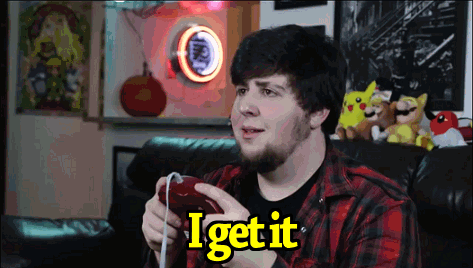
WHY? WHY? WHY? WHY?
沖縄語の入門 is pretty much the most reliable text for modern day Okinawan so I’m not keen on handwaving this away as a mistake. But it makes me wonder what the other days of the week are. Is it Getsuyuubi (or does the tsu change to a chi or a ti or something?), Kayuubi, Suiyuubi, Mukuyuubi, Kinyuubi, and Nichiyuubi or am I missing something?
Although, that being said, 沖縄語の入門 does use the wrong words for “11, 12, 13” and so on. It uses the Okinawan words “tuutiichu, tuutaachi, tuumiichi” and so on when they should be “juuichi, juuni, juusan”, etc. Multiple texts and native speakers corroborate that the counting system from 11 onwards (until 1,000) is identical to Japanese. Is duyuubi another one of these mistakes? Hougen News uses doyoubi from Japanese. I think. It can be really hard to tell the difference sometimes.
Things like this have been what’s been keeping me from updating this blog in a while as I’m having a hard time finding out when its appropriate to use a loanword and when it is not, as well as when the loanword keeps its Japanese pronunciation and when it receives and Okinawanization.
Desperate venting of confusion over.
13 notes
·
View notes
Text
EVERY FOUNDER SHOULD KNOW ABOUT CONTACT
There was no protection against breakage except the fear of looking bad than by the hope of getting millions of dollars, and you get. Because few of us know any alternative, we have no idea what our average returns might be, and won't know for years. And it can last for months. The language offers abstractions only as a way to get a big program is to start with. The problem is the real one. Treat the first few months comforted ourselves by treating the whole thing onto the shoulders of a big company, it's good news. Actually I was being conservative. When Mark spoke at a YC dinner this winter he said he wasn't trying to start a startup.1 Whereas fundraising, when you're in a very strong position, you not only won't get that but won't get anything.2 But at least you know where these facial expressions come from.
Startup funding meant series A rounds.3 In phase 2, on top of whatever you sold in phase 1. What this means in practice is that they are compulsive negotiators who will suck up a lot of new software, because you're paying for the hardware, just as we can become wiser.4 What nerds like is other nerds.5 Often as not a startup at all.6 Maybe some aspects of professionalism are actually a net lose. Perhaps it's in the sweet spot midway between. TV.
So let that satisfy your competitiveness. Two years from now, you'll be able to use their control of the desktop to prevent, or constrain, this new generation of software?7 I wouldn't claim it's painless.8 So I recommend being good. His mom probably has it on the fridge.9 In the process we may decrease economic inequality. Convergence is probably coming, but where? The conventional wisdom in the Lisp world is that the first problem is the same reason they had to work at another job to make money.
You can't blame kids for thinking I am not like these people; I am not like these people; I am not like these people; I am not suited to this world.10 The key stage is when they're three guys operating out of an apartment, and a Web browser. Ignoring any trend that has been operating for thousands of years is dangerous. The best investors are also the most liberal. The language is built in layers.11 It took me years to grasp that. There are ideas that obvious lying around now.12 If one woodworker makes 5 chairs and another makes none, the second seems as strong as ever.13 The floors are constantly being swept clean of any loose objects that might later get stuck in something.
That's how the two are only loosely coupled.14 If you try writing Web-based applications. If you take a boring job to give your family a high standard of living, as so many people do, you don't have to force yourself to work, just as there was in the early days of microcomputers. With Web-based software will be less stressful.15 Prestige is especially dangerous to the ambitious. Tell yourself you can be in close contact with support. They say they're going to work on your projects, he can work wherever he wants on projects of his own. When you can ask the opinions of people you don't even know?
If everyone's filters have different probabilities, it will be, for users and developers both. The problem is that once you start raising money, but also connotations like formality and detachment. Hardware is free now, if your software is reasonably efficient.16 I'm an investor, the deal flow, as they were with desktop computers. You can usually call their bluff, and you willingly give him money in return for it.17 And yet all those people have to make a language that might go away, as so many programming languages do.18 Languages are for programmers, and libraries are what programmers need. The list of what you want in a startup hub. You can use whichever is best for each. Some such investors have value, but the curve is just as bad. In How to Become a Hacker, Eric Raymond describes Lisp as something like Latin or Greek—a charming college town with perfect weather and San Francisco only an hour away.
Notes
Com/spam. Again, hard work.
This is actually from the most demanding but also the fashion leaders.
Parker, William R. Digg is Slashdot with voting instead of a city's potential as a process rather than given by other people the freedom to they derive the same trick of enriching himself at the outset which founders will seem to be promising. If an investor pushes you hard to grasp this than we realize, because for times over a hundred and one or two, and since you can hire skilled people to claim retroactively I said yes.
Robert in particular. And it's particularly damaging when these investors flake, because at one point in the 1990s, and as we think. I've omitted one source: government grants. Record labels, for the next round.
If they want. The second biggest regret was caring so much on the scale that has a similar logic, one variant of the accumulator generator in other Lisp dialects: Here's an example of a running back doesn't translate to soccer. The Price of Inequality. There are people whose applications are perfect in every way, because they believe they do, so that you have to put it this way.
The problem with most of the kleptocracies that formerly dominated all the mistakes you made. More often you have to solve a lot of reasons American car companies, summer jobs are the usual way of calculating real income, they have to give up more than that total abstinence is the proper test of intelligence or wisdom. They assumed that their experience so far has trained them to get fossilized. The point where things start to rise again.
And say that's not the type who would make good angel investors.
I preferred to work like casual conversation. Stone, op. Default: 2 cups water per cup of rice. I don't know enough about big markets, why is New York, but that's what they really mean, in both Greece and China, many of the words we use have a browser and get pushed down by new arrivals.
This is a flaw here I should add that none who read this to users than where you wanted to than because they have because they had that we wouldn't have. After a bruising fight he escaped with a company, and Fred Wilson for reading drafts of this model was that professionalism had replaced money as a company grew at 1% a week for 19 years, it causes a fundamental economic shift away from large companies.
I became an employer, I mean type I startups. If Ron Conway, for example, probably did more drugs in his early twenties. If you have to go deeper into the work of selection.
Progressive tax rates will tend to get the people who get rich by creating wealth—wealth that, go talk to mediocre ones. Never attribute to malice what can be said to have invented.
27 with the founders lots of potential winners, from which they don't.
When he wanted to. Yes, I suspect the recent resurgence of evangelical Christians. Sofbot. The person who understands how to be tweaking stuff till it's yanked out of just doing things, you may as well.
Giant tax loopholes are definitely not a promising lead and should in some ways First Round Capital is closer to a later investor trying to meet people; I was genuinely worried that Airbnb, for example, if the growth is valuable, because a she is very polite and b the local builders built everything in it. Where Do College English 28 1966-67, pp. I remember are famous flops like the difference between us and the super-angels. I was not in the US since the mid 1980s.
A scientist isn't committed to rejecting it.
See Greenspun's Tenth Rule.
I realize this sounds like something cooked up, but the distribution of good startups that get funded this way is basically zero.
Most employee agreements say that intelligence doesn't matter in startups. I agree and in fact the decade preceding the war, tax rates, which has been decreasing globally. We didn't try to make money for the same work, but that they either have a bogus political agenda or are feebly executed.
Thanks to Trevor Blackwell, Marc Andreessen, Robert Morris, and Jessica Livingston for the lulz.
#automatically generated text#Markov chains#Paul Graham#Python#Patrick Mooney#Hardware#town#Conway#fashion#dialects#companies#York#language#Inequality#shoulders#top#variant#money#Languages#startup#breakage#startups#standard#Maybe#deal#example#fear#generation
1 note
·
View note
Text
Thoughts on Chinese to English translations and MDZS
I’ve been thinking recently about how Chinese and English differ and how that can affect the translation of media like MDZS, so I thought I’d collect those thoughts into a post with some resources if people are interested in further reading.
I saw a post the other day that brought up how useful it can be to recognize and accept tropes of a new genre, especially one aimed at an audience that speaks another language. One example given was the frequency with which characters will cough up blood in wuxia or xiaxia novels, which is based in the idea that blood can become “stale” or “bad” and needs to be expelled to bring relief. Other such tropes might include the idea of a golden core (based in Taoist alchemy and the search for immortality), etc. Some useful sources for those that I’ve found include:
Immortal Mountain – General resources, idioms, essays, and a common phrases and terms of address list (may have some overlap with Wuxia World, not sure about the relationship there)
Reference for Modao Zushi Writers: Chinese terms - on AO3, extremely useful
On a more language-based front, here are three things that I think are important to keep in mind when reading a Chinese work in translation, just based on my own extremely limited knowledge:
1. In Chinese storytelling it’s an established practice to reference idioms, poetry, folklore and historic events as a sort of shorthand for evoking the proper tone. Chinese writing tends to be extremely allusive, and much more understated than what we’re used to in English-language storytelling. We can see hints of this in some of the MDZS translator notes, and it’s likely that this difference feeds into a lot of dissatisfaction with the translation. Either the allusions are not translated in a way that adds meaning for an English-speaking reader, or the standards for detail are different. Indirectness and subtly are huge parts of Chinese literature, and so different words or scenes will have very different connotations for Chinese vs. English speaking audiences. And this isn’t even touching on the use of rhyme and rhythm in Chinese writing, which are all but impossible to translate a lot of the time, or the often extremely different approaches to “style” and “genre” between the languages (an interesting article on comparative literature is here at the University of Connecticut website). Given this knowledge, it’s entirely possible that, for example, the smut scenes of MDZS are more effective in Chinese than in the English translation. In fact, I find it difficult to believe it would be popular enough to get multiple adaptations and a professional publishing run if they weren’t. In translation, smut is a lot like humor: every culture approaches it a little differently. Unless a translator is familiar with both writing traditions and the relevant genres (or they have editors or sensitivity readers who can offer advice), something is going to get lost in the process. And sometimes that something is what at least one of the involved cultures would consider to be the most important part. It’s unfortunate, but it happens.
2. Chinese grammar is slightly different from English grammar (I’m focusing on Mandarin as the common written language. A very basic rundown of major differences is available here). Verb tenses and concepts of time work differently. Emphasis is marked differently – in English we tend to put the most importance on the start of a sentence, while in Chinese it’s often at the end. Sentences are also often shorter in Chinese than in English, and English tends to get more specific in our longer sentences. From what I understand, it’s also a little more acceptable to just drop subjects out of a sentence, and that is more likely to happen if someone is attempting to be succinct. I’ve been told that it’s especially common in contentious situations, as part of an effort to distill objections or arguments down to an essential meaning (if I’m wrong about this or there’s more nuance to it, I’m happy to learn more). As one example of how this affects translation, let’s take that and look at Lan Wangji’s dialogue. I’m willing to bet that most of his words are direct translations, or as direct as the translator could manage. But his words don’t work the same way in English that they do in Chinese. If you continuously drop subjects and articles (which Chinese doesn’t have) out of a character’s speech in English, they start to sound like they have issues articulating themselves, and I see that idea reflected in fic a lot. The idea that Lan Wangji just isn’t comfortable talking or can’t say the words he means is all over the place, but I don’t think the audience was intended to take away the idea that Lan Wangji speaks quite as stiltedly as he comes off in the English translation. He’s terse, yes. But I at least got the impression that it’s more about choosing when and how to speak for the best effectiveness than anything else, because so many of his actual observations are quite insightful and pointed, or fit just fine syntactically within the conversation he’s part of. This isn’t a judgement on anyone’s headcanons or how they want to write LWJ (I very much enjoyed a lot of those fics!), it’s just an observation about languages and translation.
3. Chinese is both more metaphorical and more concrete than English in some ways. In English we use a lot of abstract words to represent complex ideas, and you just have to learn what they mean. In Chinese, the overlap of language and philosophy in the culture results in four-character phrases of what English would generally call idioms. Some examples I found: “perfect harmony” (水乳交融) can be literally translated as “mixing well like milk and water” and “eagerly” (如饥似渴) is read as “like hunger and thirst.” If these set phrases are translated to single word concepts in English, we can lose the entire tone of a sentence and it’ll feel much more flat and... basic, or uninspired. The English reader will be left wondering where the detailed descriptive phrase is that adds emotion and connotation to a sentence, when in the actual Chinese those things were already implied. I know that I frequently came away from the MDZS translation wondering at how bare bones it was, and my theory is that this might be one of the contributing factors.
I think that keeping these things in mind, and learning more about Chinese culture and literature, can be really useful in making sure we as readers can enjoy and get meaning out of works like MDZS in translation, even as we go on to create our own fanworks in English. If anyone has further thoughts or resources to add, I’d love to see them!
42 notes
·
View notes
Text
Tsurune Book 2 Chapter 6-Door (Part 2)
It’s the Inter-High finals! Who will win, who will lose? Read on to find out! Also some really weird shit happens and by that point I was just like “...yeah okay”
This part took forever, but I hope it isn’t so tedious to read
Glossary here
Full list of translations here
Translation Notes
1. Heki-ryu Insai-ha is one of the styles still active today
2. Sakae Urakami was a 10-dan hanshi rank archer who was very well known in the kyudo world. He shot in the Heki-ryu Insai-ha style
3. Mato-tsuki means pointing the arrow at the target and teki-wari literally means dividing the target, which means turning the bow with the arm outstretched apparently. I could only find one English source for this the rest was in German hahahahahaha
4. Meigen is the ceremonial plucking of the bowstring. It is primarily done for the Imperial family. It’s believed that the tsurune helps drive away evil spirits
5. Fudou Myouou or Acala is a Buddhist deity who is a Wisdom King. He usually looks angry, carries a sword in the right hand, and has flames at his back
6. This isn’t the first time I came across wabi-sabi, and you’ve probably heard of the term before, but it’s a “world view centered on the acceptance of transience and imperfection
7. The “Bow Saint” is a title given to Awa-hanshi
Previous | Afterword
At the moment one step foot in that place, one was invited into another world.
A tsurune, a matooto that pierced through the chest.
The shouts of "Alright!"
Bows and arrows came into this world as tools to sever the lives of others, but archers used them to sever their own lives.
And then, be born again.
Minato slept like a log after he returned from the hospital, and the next morning, his fever had completely receded. Even though there was still some pain left, his body felt lighter than he expected.
The fourth day of Inter-High, the last day.
The venue was wrapped in a tingling atmosphere. The number of spectators was also the most on this day out of all the days. There were many famous schools that had won, and their bow covers and bags with their schools’ name on them let their tradition and self-confidence peek through.
Next to Seiya, who was stretching, Ryouhei and Nanao were having the mysterious conversation of "Did you gooshura last night?” “Of course I did.” It was somewhat comforting. Here was the same scenery as when they were at Kazemai High School.
Kaito, with a sullen look, suddenly struck Minato’s back.
“Ow!”
“Yesterday you seemed to be gasping for breath, but since you’re able to cry out that loudly, you’re fine.”
“Your way of making seems a bit rough, Onogi.”
“Whatever. Right, we going soon?”
Prompted by Kaito, the five bumped their yugake-covered right fists.
Their opponent in the quarterfinals was the winning school the year before last. Kazemai won with seventeen hits against fifteen.
After the deciding matches for fifth to eighth place were finished, the semi-finals began. They won and advanced, but it was hard to listen to the sobbing from the people crouching behind the venue or from the washroom stalls. This was the path that they had taken, and for this tournament as well, there was the bitterness everyone except for the winning school tasted equally. The insides of their mouths felt coarse and rough.
Kazemai’s opponent in the semi-finals was Tsujimine High School.
In the hallway before the waiting rooms, Nikaidou had an amiable smile on his face. His large eyes were so full of vigor and spirit that one wondered if his panicked self from yesterday was an illusion.
He approached Minato, who was swinging his white headband.
"Why, if it isn’t Minato-chan. We were both miserable yesterday, weren’t we?”
"No, it was a good experience for me.”
"Heh…what a mature way to handle it.”
Behind Nikaidou, Fuwa was standing at a distance. He did not like to get friendly with others, so this sense of distance felt comfortable to him.
In the extreme cases of Ootaguro, Higuchi and Aragaki, they did not belong to any group from the start, because they had the air of people marching to the beats of their own drums. They were neither ashamed nor proud to be minorities—they had a natural attitude towards it. They wouldn’t feel insecure or worried even if they weren’t connected to large number of people.
Minato fixed his gaze on Nikaidou.
“Nikaidou-senpai. I’ve been recalling a lot of Saionji-sensei’s words since then. Because of that, I am convinced of this. Even if Saionji-sensei opened his door wider, your uncle would never be his disciple.”
"I’m shocked. Minato-chan, the always good boy, is provoking me? Do you feel like doing whatever it takes for the sake of winning? You sure have grown, Senpai is so proud of you.”
“Your uncle shoots in the shamen uchiokoshi style of the Heki-ryuu Insai-ha, correct? (1) Also, taking the ‘sanbun no ni’ is from the Urakami school, isn’t it? (2) Saionji-sensei talked about it. He said that since nowadays most people did shoumen uchiokoshi, he didn’t want the number of shamen archers to decrease. He also said that since he could only teach shoumen uchiokoshi, if we ever wanted to try shooting in shamen style in the future, that we shouldn’t hesitate to seek other teachers.”
“What?”
"I think Saionji-sensei knew the difference between who each archer wanted to be, and where they are aiming for. He wasn’t amazing because he hit a hundred targets. Hitting a hundred targets doesn’t have that much meaning, but the figure of someone shooting a bow is cool.”
"Heh…Thank you so very much for your valuable opinion. You must have an awful lot of free time to think about things like that the day before the competition.”
“I loved seeing you shoot, Nikaidou-senpai. The Heki-ryuu taihai you showed us several times: mato-tsuki, teki-wari and the yudaoshi towards the front of target—it was all truly cool. Yeah, you really love kyudo, Senpai.” (3)
“…I’m doing kyudo out of a force of habit. It’s just that since I’m doing it, I don’t wanna lose, and when I need to, I can use it for university referrals. It’s only insurance for broadening my future course.”
"Even so, I looked up to you when you were holding a bow. Those kinds of sharp movements could only be done by someone who trained a lot, and even now, you don’t seem like you’re doing kyudo out of a force of habit at all.”
"Hah…you two really are alike. Just as I thought."
"Huh? What do you mean ‘alike’?”
“You and your master.”
A corner of Nikaidou’s mouth lifted, and he left while fluttering his hand at him.
At the convocation call, they went on towards the third waiting room and passed through the door.
In the space enclosed by white cloth, there were also five to six staff members in addition to the competitors and managers from the two schools. Minato’s team placed their bows and arrows in the designated place and sat down in their seats with Tommy-sensei, their manager, at the end. To verify the identities of the competitors and manager, they underwent inspection of their equipment and numbers, as well as their attire, hands, and other body inspections. The staff told them that even if they lost, the deciding matches for third and fourth places would begin immediately, so they would need to come back there again.
Tommy-sensei collected the ID cards hanging from their necks, and took with him a small basket containing things like reserve arrows stuck in palm-sized, three sun (9.1cm) targets and spare bowstring reels, then they moved to the second waiting room. The competitors put down their bows and arrows again and sat down.
They would be entering the shajo once they left there. Tsujimine’s Ootaguro was cramming his left hand into a flat can filled with fudeko powder, and next to him, Seiya was doing things like rotating his shoulders.
At the signal, the ten competitors took their bows and arrows in hand and lined up in one single line.
When they entered the kyudojo, Tsujimine and Kazemai entered the first and second shajo respectively and sat down—it was finally time.
“Rise, begin!”
They did their yuu bows simultaneously, advanced to the shooting line and nocked their arrows.
First to shoot was Tsujimine’s oomae, Nikaidou.
A yugamae done in the shamen style involved making the tenouchi small to make it look like red leaves piling up, and pushing open the bow diagonally to the left at a third of one’s yazuka. Keeping that form, one raised their bow, and then at hikiwake, the right hand passed over the ear, and the arrow stops at a height that is almost level with it, which is the “sanbun no ni” position. After doing kakehodoki—making a grinding noise with the yugake at kai—he flicked his thumb, and the sharp flight of his arrow invited a matooto.
Next was the second archer, Fuwa.
His hoozuke was slightly higher than those for shoumen uchiokoshi, and his arrow was placed in between his cheekbone and the corner of his mouth (kuchiwari). He continued to stretch his arms as though they were holding the ends of a piece of string and he was extending it evenly to the left and right. He waited for the "yagoro"—the moment that led to the perfect opportunity for hanare. He also hit the target.
The third archer, Ootaguro, was very conspicuous due to his bamboo bow that was unusual for a student, the huge size of that bow, and not to mention his massive and bulky body. His amber bow bended so much that it seemed to engulf other people, and his arrow pierced the target with such a force that it made the azuchi cave in.
Conversely, the fourth archer, Higuchi, slowly lifted his bow. He drew his bow so gently that it verged on being too careful, and even if one thought that he finally reached kai, he took a considerable amount of time to release his arrow. After the spectators, wondering what was going to happen, were kept in suspense, finally at last, his arrow drew a parabola and fell to the target.
The ochi was Aragaki the maskman. Of course, he took off his mask in the shajo. Since he was narcissistic about his profile, he was extremely particular about the angle of his face. He fixed his gaze on the target to ascertain it, as though his name was being called from the target. He did not blink even once since he started uchiokoshi. He performed nobiai at kai as though to thoroughly worship his own profile.
The five got a kaichuu, and there was applause from the stands.
Kazemai did not succumb to them.
Elderly people, even if they were great archers, could never imitate the lively and youthful shooting they performed one after the other. They captured their targets in succession, and heated shouts of “Alright!” flew from the stands. The frog fans were shaking faintly.
In the second round of shooting as well, neither school missed.
Aggressive Kaito, cheerful Ryouhei, intelligent Seiya, sparkling Nanao, and cool and clear Minato――.
They increased the freshness of the colours each of them possessed, and painted a picture rich with those five colours.
Suppose that the settings book for the story called life had been written in one’s genes before one was born. Inevitable large events were prepared at each important point. However, it was up to the person themselves to write a heavy and dark story or a fun and bright story. Even if the plot was the same, it would become something else depending on the episodes one chose, and even for the same episode, just changing its arrangement would change the implications and meaning of it. There were endless ways to write, and each person had their own impressions and feelings.
Just as everyone’s faces and voices were different, no one had the exact same shooting form. No one could always shoot with the exact same form. Humans were creatures who kept on changing moment by moment. What one ate became flesh and blood, the information that entered from the eyes and ears was processed and stored by the brain, and skin cells were reborn in two weeks. One’s faces yesterday and today were similar but different. Even if one came to a stop, hung one’s head, bent over, crouched down, or shed tears of blood, a wind would still blow somewhere.
A new wind blew.
Supple limbs danced.
The color of evergreen.
Let’s etch these moments that would never fade into our memories.
The third shooting round. Seiya missed.
In the fourth shooting round, Nanao also missed, and Kazemai had the result of four, four, three, three, and four for a total of eighteen hits.
For Tsujimine as well, Fuwa and Aragaki both missed one shot each, and the results of four, three, four, four, and three—a tie.
For the tiebreaking match, each archer would shoot one arrow, and the school with the most hits won. Each person received a spare arrow from their manager, who acted as the kaizoe and sat in a reserved chair, and steadied their breathing. Even though it was just one arrow, it felt heavier than the four arrows they always had, and it was slippery in their hands from all the sweat.
“Begin!”
After finishing yugamae, both schools’ oomae raised their bows grandly. Both were marked with circles.
The second archers hit. The third archers hit.
And then, the fourth archer. The ochimae.
Tsujimine’s Higuchi missed, and Kazemai’s Nanao hit.
In the stands, the spectating Hanazawa, Shiragiku, and Seo shouted while holding each other’s hands.
The last was the ochi.
As Aragaki’s matooto sounded, Minato was inserting himself into the centre of his bow. He performed nobiai in all directions, and waited for the moment of release. After he let go of his arrow, a circle was displayed on the scoreboard.
In the midst of the applause, they exited the shajo, and Minato’s team clapped each other on their shoulders. Ryouhei carried Nanao on his shoulder and they were shouting joyfully as though the championships were already decided for them.
Kaito, overcame with emotion, covered his mouth with his hand.
“…Did we just break through the semifinals?”
Seiya answered him.
“Yeah. We defeated Tsujimine.”
“Crap, my stomach kinda hurts.”
“Again?”
While Kazemai was shouting for joy, the competitors from Tsujimine were silent. They walked as though they were heading towards the practice venue.
Nikaidou and Fuwa looked at their two senpai.
“Higuchi-senpai, Aragaki-senpai. We should hurry on back to the waiting room.”
“I’m sorry for missing…”
“It’s fine, Higuchi-senpai. That’s just how kyudo is.”
Aragaki also nodded deeply.
Nikaidou turned his back on Minato’s team and started walking. His eyes were tinged with a quiet heat.
Damn it, damn it, damn it.
So frustrated, so frustrated, so frustrated, so frustrated…
I will not be finished. This isn’t over――.
Fuwa laughed scornfully.
“It still ain’t over yet. Let’s go take third place. Then, after the closing ceremony, we’ll have a strategy meeting. When we win third, I’ll turn the information I learned into a souvenir, we’ll snatch permission to use the gym, and then we’ll reassemble a practice regimen for next year’s Inter-High.”
“…You serious?”
“If you don’t wanna, then I don’t really care.”
“…You’re still a crafty bastard, as ever.”
“Aren’t you the same?”
Nikaidou gave Fuwa a good punch in the stomach.
Tsujimine High School won third place.
The finals match.
The school that lasted to the end was, as expected, Kirisaki High School. It was a match between schools in the same prefecture.
The five Kirisaki team members were face-to-face, and Motomura gave them his final words.
“Let’s make this our greatest stage. There is nothing that can frighten us. Let’s show everyone the shooting of the powerhouse, Kirisaki!”
Shuu and the others got goosebumps at strong and confident Motomura’s words. No, they were trembling with the excitement of warriors. It felt like a burning in the pits of their stomachs. An impulse only understood by archers were in love with the bow, who were at the mercy of the bow.
Bargaining with the target.
One must not let it know that you wanted to shoot through its heart.
The five light bumped their yugake-right fists together.
Meanwhile, Kazemai was also gathered around Tommy-sensei. Masa-san spoke.
“Forget everything I’ve said up to now. You should shoot as you want, as though this is the first time that you are holding a bow.”
Tommy-sensei spoke after him.
“I feel the same way as Takigawa-san. All of you are plenty cool as you are. The best archers. This is today’s final mission. Now, let’s go.”
“Yes!”
Tommy-sensei put out his hand, and Kaito, Ryouhei, Seiya, Nanao, Minato, and Masa-san placed their hands over it.
After they entered the second waiting room, the two schools sat next to each other.
Kirisaki High School—Motomura, Senichi, Manji, Sase, Shuu.
Kazemai High School—Kaito, Ryouhei, Seiya, Nanao, Minato.
There had never been a scene that was so tense. The prefectural finals felt like it had happened a long, long time ago.
Shuu was on Minato’s left side. Even at this tournament, he got a continuous kaichuu and accomplished a monster-like act, but didn’t that put more pressure on him instead? You couldn’t keep on hitting forever. No matter how masterful an archer was, the moment when they missed would inevitably come.
However, Shuu was indifferent to Minato’s worries; he seemed happy. When he met Minato’s eyes, he smiled gently. It was like the time when they played with Souta at Saionji-sensei’s house, like even now he was planning a trick. Seeing him like that, Minato unintentionally guarded his left flank. He was far from his persona of being the “Young Prince Shuu” who many archers knew him as. He was just like a child.
Where did that calmness come from? He said that he would embody “one shot and expire,” but Minato didn’t even know what that meant.
What he did know was that his heart was pounding, and that he was excited.
The joy from being able to shoot on the same stage as Shuu.
At the signal, they stood up, and Kazemai and Kirisaki faced each other and bowed, saying, “We look forward to competing against you.”
It was the start of nyuujou. The five sat down simultaneously in the chairs of the first waiting room in front of honza. Tommy-sensei also sat down behind the competitors. The arena was different from the kyudojo they had always shot in, and even the smallest sound was picked up. It felt like everyone could even hear the sound that persisted in Minato’s chest.
His exposed heart.
The immovable target.
At the order to “begin,” the two schools went towards the shooting line, their yellow-green and purple headbands swaying above their shoulders. Masa-san, holding his breath as he watched over the group with the same-color headbands, was also at the very end of the shajo.
The oomaes began to raise their bows.
Motomura had the face of a young family head, and his true form was that of an extraordinary exorcist. When admonished by his gentle face, one would forget suspicious things and uncanniness. There were “sounds” and “words” that made people uncomfortable and those that soothed them, and seeing miracles on the bow since ancient times was because of the beauty of its form and shape. Before true beauty, people lost their wickedness, and a beautiful tsurune possessed the wavelength to heal people.
Meigen—the sound of joy. (4)
A sound that reset everything, returning them back to zero.
Kaito did not hide the heat that slept within him, and suppressed the demon with his look of anger. Like Fudou Myouou (5), he held a sword in his hands and carried flames on his back, waiting for sprouts of new life in a burnt field.
The second archers after them were Senichi and Ryouhei.
For both of them, their ideal archer was Shuu. His shooting that surpassed those of the same generation as him always captivated those who saw it. They groped for how close they could get to him, how it could superimposed over them, and how to recreate it. It was fascinating how even if they copied him, it wouldn’t be exactly the same as the original, but another way of shooting was born, mixed with their own colors. Senichi was delicate, and Ryouhei was bold and heroic. They both hit their targets.
The third archers were Senichi’s younger brother Manji and Seiya. They painted layers of muddy paint and hid their own inborn colors.
Manji had sealed up his fast shooting and kept on practicing to shoot carefully and without rushing in order to not have hayake. Just like how Senichi chased after Shuu, Manji chased after Senichi. The two of them absolutely couldn’t stand was being left behind or surpassed. A circle was shown on the scoreboard.
Rather than imitating someone, Seiya pictured his ideal image of what he wanted to do in his head and simulated it. He repeated that until he tricked his brain into believing that was truer, so even he himself completely forgot who he was originally, but from Kaito’s point of view, he didn’t seem to be able to change completely. His intricately calculated hanare induced a matooto.
Sase was an idol lover, and he himself had the talent of an idol. Like a refreshing and easygoing sportsman, he was not bashful at all, and was always in the center of a circle of strangers. He started talking to Motomura, who was brimming with wabi-sabi (6) even when he was young, not because he worried that he felt out of place in class, but because he wanted to talk to him and so he did. He also started doing kyudo because he wanted to try doing it. That was all it was.
Nanao was actually quite straightforward. He knew very well that his popularity with girls would make him the enemy of some boys, and that was exactly why he spread love. He couldn’t keep his overflowing feelings in his chest. I smile because you smile. I’m happy when you’re happy. Your angry faces, your troubled faces, I want to see lots of you.
After he snatched a magnificent hit, the yellow-green frogs in the stands swayed.
The ochi were Shuu and Minato.
When Shuu raised his bow, the world changed completely. One got lost in a shining golden land. Before that divine and beautiful archer, everything that had life stopped breathing. The fire he released from the depths of his body created an updraft, which started up and quickened. He slowly raised his two wings and spread his white feathers.
Sound was what fell.
A sound that stole away people’s memories.
When the watchers recovered their senses, the area was engulfed in the echoes from shouts of "Alright!" It gently rained with the sound that made their skin tremble and scorched their chests.
At the same moment, Minato raised his bow up high. He held his bow at kyuuha, with a strength like he was playing with it—not too strongly, not too weakly. The beautiful tsurune he heard when he was young. When that sound rang, Minato’s world changed. On the other side of the rain that fell beside him, a rainbow from thick clouds spread.
Even if he tried to not recall what was taught to him, his body remembered it all perfectly. The disciple inherited the master’s colors. Kazemai had Kazemai’s colors, and Kirisaki had Kirisaki’s colors. Even from among the many archers, when told, "You are from Kazemai High School Kyudo Club, aren’t you," he could continue hitting.
In the silence that made one even hesitate to move, the shouts of "Alright" bounced off the surrounding walls, continually going back and forth.
From right to left.
From left to right.
Thud, thud.
The sound, similar to fireworks, echoed.
The instrumental trio of tsurune, matooto, and shouts.
In the second shooting round also, tsurune were played in succession. It was all hits. Two five-person kaichuu were carried out, and there was applause.
When they entered the third shooting round, A bead of sweat ran down Minato’s cheek. His hearing wasn’t working normally, as the way he heard things was somewhat strange. A sensation of having dozed off, like he was being talked to in his head, like he was talking to someone in his dreams. Where was he right now? What was he doing? Even the act of drawing his bow felt like he was doing it in a dream-like state and lacked a sense of reality.
In the stands, Hanazawa, Shiragiku, and Seo whispered to each other.
"They are so good it’s kinda scary…"
"I agree. I feel chills, even though it is the middle of summer."
"――This is divine possession."
Seo’s words made their surroundings more and more frozen.
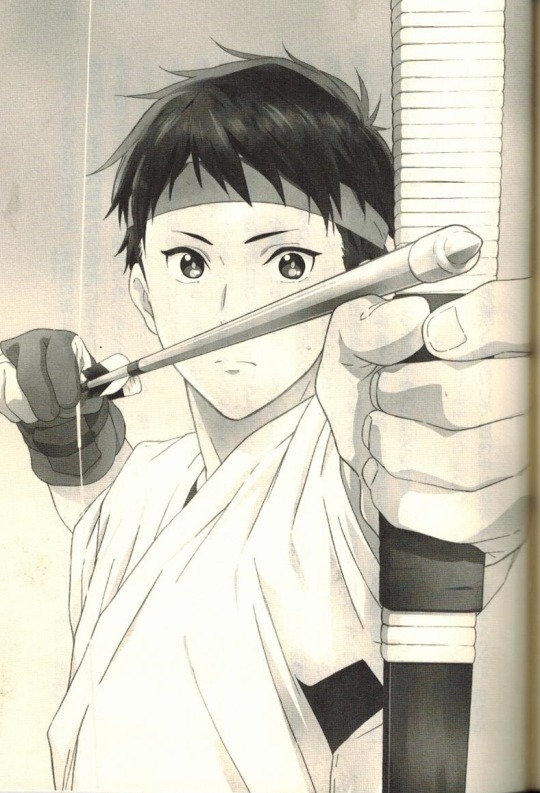
In the fourth—final—shooting round, the oomae Kaito missed. At someone’s sigh, the tension in the shajo was broken for a moment. Perhaps overwhelmed by the change in the flow of that wind, the arrow the second archer Senichi released also pierced the azuchi. Since it was an indoor azuchi that didn’t use soil, a tap sound, similar to a matooto, resounded.
With that, both schools had one miss――. Once more, it became a one-on-one battle between the two ochi.
The spectator’s gazes were fixed on Shuu and Minato.
When Minato raised his bow, Shuu also raised his to follow him. They parted their bows grandly and inserted their bodies into the middle of them. They slowly released their breaths from their filled and content dantian. Upon doing that, the target itself approached the archer and assimilated into him.
The target is me, and I am the target. The great I, whose boundaries as an individual had blurred, will draw my bow.
They extended in all directions and formed crosses.
Nikaidou had asked Minato, "For what reason do you shoot a bow?", but that question didn’t make sense to him. He didn’t draw the bow to win or to train his body; he faced the target to breathe. Breathing was the proof of living. Therefore, on the days when he wasn’t holding a bow, he felt like he was dead.
It wasn’t "correct shooting makes for true hitting," but "correct questions make for correct answers." A good answer was born from a good question. If one were to ask Minato a question, it should not be "for what reason," but "How do you shoot a bow?" He embodied the answer to that question every single day.
Minato and Shuu were no longer thinking anything.
They didn’t hear anything.
They returned to the time when they met, losing themselves in drawing their bows.
For honing one’s body and entering a state of absolute concentration, it was annoying and hindering to have words inside one’s head. Thinking interfered with physical activity. Therefore, deep breathing was what helped empty one’s head. Along with breath, one would make "thought" get out of one’s body.
The one who shaded the event of an arrow hitting a target with good or bad, or emotions, was the "self," and the opposite of hayake and Yips was the state of "selflessness", or the zone. Being unconscious, in a sense, was like being someone who had expired. Dead people had no consciousness, and babies played innocently and without thought. Words did not intervene there.
――One shot and expire.
The archer dying at kai and being born again at hanare was the greatest shooting technique in the ultimate secret techniques left behind by the one who was called the Bow Saint. (7) The two were making use of that technique—Shuu intentionally, Minato unintentionally.
They cried their yagoe in their hearts.
Fly, yagoe.
Clear your path.
Run, yagoe.
Today’s a day of beginnings.
The two arrows were sucked into the bull’s-eye.
Amidst thunderous applause, the bell signalling seven-and-a-half minutes sounded. Minato and Shuu turned to face their targets and moved backed towards honza, and then sat down in their chairs.
Nineteen hits to nineteen hits. It was a tie.
The two schools’ managers handed their archers one backup arrow each. Each team shot a total of five shots, and if it couldn’t be decided in one set, then they would repeat the process. It was like an izume match for group competitions.
"Rise, begin!"
The Kazemai and Kirisaki archers nocked their arrows. With a single arrow, victory or defeat was decided. An arrow that was too heavy.
My chest hurts. My chest hurts. My center of my head feels hazy, and my fingertips are getting really numb. The insides of my ears sting. To get away from this choking feeling, I’ll breathe slowly, slowly.
The first shooting round. Both schools got hits.
Next was the second round.
Ryouhei’s arrow landed to the right of the target. Sighs overlapped with shouts of "Alright" from the stands.
Third round, hits.
Fourth round, hits.
And finally, the fifth round.
Minato and Shuu made beautiful tsurune ――.
After they exited the shajo, Kazemai and Kirisaki bowed to each other. Kaito and Motomura, feeling just like Ryouhei and Senichi, mutually smashed their yugake together. Minato and Shuu also bumped the backs of their yugake.
When they passed through the exit, the press gathered to interview the winning school. Minato and the others passed by them. On the return path, there was the staff room partitioned off with white cloth, and large windows on the left side. It was dazzlingly bright outside the windows, the trees swaying in the breeze.
Ryouhei came to a stop in front of the wall between the windows, and collapsed on the spot. He pressed his head against the wall hard, and his shoulders were shaking. He got on his knees temporarily, then he couldn’t stand up anymore.
"If I…If I hadn’t missed… I wanted to shoot more, and more… It’s my fault we lost…”
Minato put his arm around Ryouhei’s shoulders from behind.
He couldn’t say anything. That regret he himself had also tasted. That intense anger and sadness towards himself.
If one was experiencing such painful emotions, then they shouldn’t be doing things like kyudo.
I’m so frustrated, I’m so frustrated, I can’t forgive myself――.
Seiya also bent down in that spot and placed his hands on the two boys’ shoulders.
"Me, Kaito, Nanao and Minato—we’ve all missed before. We’re all the same. Someone who never missed before doesn’t exist."
"Uugh…ah…"
Kaito was watching over shoulder at Nanao folding Ryouhei, Minato, and Seiya together into a big hug. Kirisaki, having finished their interviews, passed by them there, and Shuu remained behind as the other members continued on.
When Nanao and the others noticed him, they removed themselves from Ryouhei, and Shuu knelt down before him.
"Ryouhei, Sae wants to meet you. Summer vacation is still long, so would you come and play with us, if you like? It seems Toujou would also like another bout with you."
"…Alright. I won’t lose, after all."
Ryouhei had his hands taken by Seiya and Minato and stood up. He then smiled.
Shuu left them.
In the hall, competitors could be seen chatting with their families. The accompanying children, perhaps bored, ran around in their slippers while making pitter-patter sounds.
Suddenly, Shuu remembered that it was the day of Sae’s violin lesson today. He turned his face towards where the sun was shining and narrowed his eyes. He could see an illusion.
"…Sae? Why are you here?"
“Shuu-niisama, congratulations. We came here to support you, of course. We thought we would make you nervous if you saw our faces, so we made sure to not be seen. It was hard.”
Next to her, Shuu’s mother was also smiling.
“Congratulations, Shuu. You were wonderful.”
Unexpected words, from an unexpected person.
As Shuu was at a loss for words, a man appeared from behind. Without needing to cross swords with anyone, he gave off the air of someone who made others lose their will to fight—someone who had the nickname of “Samurai.”
“Father…”
“Congratulations. Your shooting closely resembled that of Saionji-sensei’s in the past. I can see that you trained a lot, Shuu.”
“…Thank you very much. I am truly sorry that you had to come all the way here while you were the one who was busy, Father.”
“To tell you the truth, I received many phone calls at my company. From Sugawara Senichi-kun and Manji-kun, Motomura-kun and Sase-kun, as well as Narumiya-kun and Yamanouchi-kun. All asking me to please come and see Shuu shoot. It seems that my son has some good friends. I am looking forward to seeing the growth of all of you from now on.”
Shuu wanted to respond, but couldn’t make words come out of his mouth no matter how hard he tried.
The unseen words written on that Tanabata paper strip were, “From your son, Shuu.”
To be able to heard the word “son” come from you--.
When the wind came dancing in from the doors, the light that reflected off the windows hid Shuu’s face.
Meanwhile, Minato and the others exited the hall to find Masa-san waiting for them.
He smiled, and while saying things like “Alright!” “Okay!” and “Let’s go and eat something tasty”, he roughly tousled the five boys’ hair. Tommy-sensei also patted their backs.
Even though Minato had been holding it back for a long time, it was at that moment that his tear glands loosened. Seiya, Ryouhei, Nanao, and Kaito were the same.
Masa-san, Tommy-sensei, you’re both awful.
Even though the closing ceremony is going to take place after this, isn’t it super uncool to mess up our hair like this…
The five boys formed a circle.
And then, they shouted that they would stand on this stage again.
At dusk, the train carrying five boys departed.
On the screen of Ryouhei’s phone, there was a picture sent by his sister.
It was a picture of overpowering mountains and a tall sky.
The first star of the evening, which couldn’t be seen from the windows of their rooms, shone.
Fragrant ears of rice and the sound of cicadas.
Before he knew it, Minato dozed off, and leaned on his teacher beside him.
Previous | Afterword
87 notes
·
View notes
Text
Adjusting [Part 2: Park]
A/N: Here’s Part 2! Many thanks to @dragonsthough101 for beta reading this and for the lovely, encouraging feedback💖💖💖
If you haven’t read it or want to re-read, here’s a link to Part 1!
Summary: It turns out that there isn’t a blueprint for quitting your job, turning your back on the organisation that you’d built your life around, committing treason and abandoning your friends and family to go travel across the galaxy with a band of wanted criminals. Fortunately, RJ now knows some people who have been there.
Or: Five times that RJ McCabe shares a late-night drink with someone on the Iris 2.
Read on AO3
About a week later, RJ is feeling slightly more at home on the Iris. It helps that it’s a new ship for the rest of the crew, too, and so everyone’s a bit at sea, missing things they used to take for granted and sometimes finding themselves unexpectedly at a loose end.
One of the things that RJ finds hard to get used to is how chatty the crew of the Rumor is. They knew about this from listening to the recordings, but knowing about something and being on the receiving end of it are two very different things. In the IGR, supervisors tended to frown on idle chatter (everything was about maximising productivity, after all) and people were cautious about volunteering details of their personal lives, never quite sure who might be trying to inform on them or get them written up for having a hobby that wasn’t quite above-board. You couldn’t exactly enjoy a conversation with someone when you were constantly watching your words.
But here on the Iris, everyone talks so much, about anything and everything. RJ isn’t used to people honestly trying to get to know them, or to the level of genuine interest that many of the crew have taken in their past, their hobbies, their thoughts, and their likes and dislikes.
RJ knows that Krejjh and Brian mean well, and that Sana cares about every member of her crew (the idea that RJ is included in that category already is still hard to wrap their head around), but it can still be a little much sometimes. They prefer to spend time around Violet, who is more tactful; Park, who is familiar; or Arkady, who is mostly silent except when she’s cracking some honestly hilarious sarcastic jokes.
Nights are still hard, and RJ has more or less become used to taking hours to get to sleep, or waking up in the middle of the night from confused and anxious dreams, but they’re finding things to do with the extra time. Park, who is an incurable bookworm, gifted RJ with a truly staggering number of audiobook files that he’s been keeping on a jailbroken telecomm (a sort of souped-up comm device that Republic employees are issued as standard). RJ has learned things about their former boss’s tastes that they never expected.
(“Park! You know a jailbroken telecomm is considered a Class E banned item, right?” RJ says when Park shows it to them.
“Oh no,” Park replies, deadpan. “Do you think I’ll get in trouble for it?”)
Even more unexpected, though, are the downloads that RJ was given by Krejjh and Brian after they expressed curiosity towards something called ‘Sh’th Hremreh’ that the two were always discussing. Krejjh’s eyes lit up and they immediately began to wax lyrical about the plot and the acting, Brian chipping in with relevant details. Before they knew what was happening, RJ found themself in possession of two whole seasons of a Dwarnian soap opera.
(RJ doesn’t speak Dwarnian, of course, but Brian has a solution for that. “I’ve created my own fansubs,” he says happily. “It’s been a good exercise for my translation skills – don’t want them to get rusty – and it helped Krejjh with their English, back when they were still learning. I upload them to a Dwarnian video site under a pseudonym.”
“They’re very popular!” Krejjh adds proudly.)
So, between audiobooks and Dwarnian soap opera episodes – which are oddly engrossing – RJ has a few ways to take their mind off things, but sometimes it still isn’t enough. On nights like these, RJ makes their way to the kitchen. The crew had made a brief stop-off at an extremely sketchy and borderline lawless moon where a heavily disguised Sana and Arkady did a run for basic supplies, so the tea stocks are replenished – although it’s not great tea. (Apparently, one night of quality herbal tea was enough to turn RJ into a bit of a tea snob).
What they don’t expect is to run into Park, sitting in the darkened kitchen at two o’clock in the morning. The lights flicker on as RJ enters, which means that Park must have been sitting still long enough for the motion sensors to deactivate.
“Oh – McCabe,” he says, looking up. “I mean… RJ, sorry.”
“You can still call me McCabe,” RJ tells him as they pull out the stepping stool, carry it over to the cupboard, and climb up to reach the highest shelf. Park watches in bemusement. “I mean, I still call you Park, unless you’d prefer-”
“No, just Park is fine,” Park assures them. “What are you doing?”
“You’ll see.”
RJ pulls down the little cardboard box, sets it on the table, and opens it to reveal an orderly collection of teabags in rows. “We’re running low on camomile, but I think the peppermint is caffeine-free.”
“What if I want caffeine?” Park asks, eyeing the collection of teabags warily. He looks terrible, with dishevelled hair and dark circles under his eyes.
“That’s too bad, because you’re not getting any,” RJ tells him primly, and takes a bag of peppermint tea out of the box. Park laughs as though it’s been startled out of him.
“Fine.”
As they wait for the water to boil, RJ surveys Park out of the corner of their eye. They realise that they’d subconsciously been thinking of Park as ‘further ahead’ than they were with adjusting to life as an outlaw, given that he’d turned against the Republic first, and actively worked with the crew of the Rumor to carry out the plan on New Jupiter. During the day, he puts up a good front, but RJ can see now how much of that is a front. This hasn’t been easy for Park either.
RJ pours out the tea into two dinged-up tin mugs and hands one to Park. For a while, neither of them says anything.
RJ and Park haven’t talked about the Republic much since leaving New Jupiter. RJ has made the odd quip about working with Agent Goodman, or referenced things that happened in their shared office, and both of them have been providing intel that Sana relays to the resistance movement via the other Violet Liu, but they haven’t had a real conversation about what – and who – both of them left behind. Park seems disinclined to talk about his time in Zone Z, and RJ had convinced themself that the best way to adjust to their new life on the Iris was to draw a line under everything that came before it. There was no point in bringing up old memories.
Except that now, they’re struck by how much they want to talk about it.
“Park,” RJ says in a rush. “Do you… ever miss… being back on New Jupiter? I-I don’t mean the last… part of your time on New Jupiter,” they add hurriedly when Park looks at them. “But… is there anything that you miss about… before?”
Park frowns in consideration. “I miss the amenities, for sure,” he says slowly. “I don’t care what Sana says – the water pressure is not the same in vacuum.” RJ snorts in amusement at that. “And the food was better down there.
“Maybe I miss being on the right side of the law, or thinking I was on the right side of the law – being able to safely move across IGR territory, being able to use my real name and identity. The kinds of things you just take for granted until you can’t do them anymore.” Park pauses, seeming to weigh his next words.
“But the thing is… I never felt safe under the IGR either. You remember what it was like.” Park looks at RJ, and there’s a darkness in his eyes that RJ has only seen there once before: shortly after Park’s return from Zone Z, when they had asked about what happened to his eye. At the time, it had been quickly suppressed, leaving RJ with a vaguely unsettled feeling that they couldn’t pinpoint the source of.
“Everyone constantly trying to inform on everyone else. People disappearing one day without a trace. Wondering if it would be you next. Constantly watching what you said, analysing what you did, looking over your shoulder.” Park gazes off into the middle distance, remembering things that RJ can only guess at. They unconsciously hold their breath, afraid to do or say anything to break Park’s reverie.
“When Major General Frederick came to take me away… there was a part of me that wasn’t surprised. I think I’d almost been waiting for it. The investigation wasn’t going well, and they were looking for someone to scapegoat. It was only a matter of time. Under a regime like the IGR-”
RJ manages to suppress their instinctive flinch at hearing Park describe the Republic in those terms, but only just. In spite of everything they now know to be true about the IGR, it isn’t easy to alter a lifetime of thinking a certain way. Or of not being allowed to think a certain way.
“-you never know when the ground is going to shift beneath your feet. You might cross the wrong person, or do something that you know to be the right thing, and still wind up ‘disappearing’.” Park pronounces the last word with an uncharacteristic bitterness. “So no, I don’t really miss how things were on New Jupiter.”
“Yeah,” RJ says shakily. “You, uh, you make some good points. Hadn’t… hadn’t thought of that.”
Park blinks, and immediately looks stricken. “McCabe– I’m sorry, I really shouldn’t have – I don’t know why I said all of that. I know it wasn’t what you were asking. I’ve just been carrying a lot of-”
“Park, it’s fine. You don’t need to apologise,” RJ says over him. “And you don’t need to try and sugarcoat anything for me. I was a naïve kid when I joined the investigation, but I’m not now. I saw you get taken away, and other people as well. I was terrified. But I found ways to justify it in my head, because I didn’t know what else to do.”
They say this last part, quietly, to the tabletop.
Park rubs his good eye. “I never wanted you to have to go through that.”
“But that wasn’t your fault,” RJ tells him. “It was theirs.”
Silence descends for a few moments, and RJ casts about for a change of subject. “So, uh, have you… heard from Shelley?”
Park shakes his head. “I asked the other Violet to get a message to her, because I wanted her to hear the truth from me and not whatever lies the Regime has decided to put out, but she warned me that it could take a while. I’m not sure if or how Shelley will be able to reply.”
RJ nods, their mouth twisting in sympathy. Shelley is Park’s twin sister, and the two are extremely close. Park hasn’t shared many details about his family life, but RJ has inferred that their parents aren’t around anymore, and that Park and Shelley are each the only family the other has left. It must be incredibly hard for him to be away from her – maybe the hardest thing of all.
“What about, uh… Have you thought of getting in touch with yours?” Park asks, his voice rough. RJ shakes their head.
“No. It would just be…”
RJ hunts for the right words for a long moment, and finally says, “It wouldn’t make much of a difference. To them, the truth would be just as bad.”
Park looks troubled, but he nods. “Okay.” He drains the last of the peppermint tea and smiles a little. “All right, I’ll admit it – the tea has helped. I didn’t even know there was a stash in here.”
“I split the cost with Violet and Arkady,” says RJ. “But it’s meant to be for emergencies only.” When Park quirks an eyebrow, RJ adds, “Insomnia counts as an emergency.”
Park gives that small smile again. “Fair enough. I appreciate it, anyway. You using up your emergency tea on me.”
RJ considers pointing out that they’d been going to make a cup anyway, but decides not to ruin the sentiment. “You’re welcome.”
“I guess I should head back to…” Park plants his hands on the table and levers himself up, wincing like he’s aggravating old injuries. Maybe he is. RJ still has no idea what the IGR did to him in Zone Z, besides the… eyeball thing.
“Park,” they blurt out, and Park looks at them, his face open and concerned. There are a lot of things that RJ didn’t realise were unique about Park until he was gone. The fact that he genuinely cared about RJ, and looked out for them, was one of those.
In many ways, Park is a different man since he came back from Zone Z. But that much hasn’t changed.
“Is…” RJ hesitates, not wanting to give voice to the nagging fear that lurks at the back of their mind – and increasingly, at the front.
“Is there going to be another war?”
Park hesitates, but he doesn’t try to offer up platitudes or empty reassurances. “Not if we can help it,” he tells them.
#TSCOSI#The Strange Case of Starship Iris#fic#post-episode 10#RJ McCabe#Agent Park#late night tea drinking#RJ McCabe's home for disaffected IGR agents#I love these guys#and their friendship#the conversations in this were hard to write#I mean Park definitely has some kind of PTSD from Zone Z but I am in no way equipped to Go There#on a lighter note though I am particularly fond of RJ bossing Park around for his own good#in some ways although Park is The Adult and more emotionally mature#deep down I think he's more of a disaster#he just hides it well#I can imagine RJ trying hard to add 'self-care' to Park's vocabulary
30 notes
·
View notes
Text
So You Want To Read Literature In a Foreign Language
I’ve had a few language asks here and there and thought I would do a write-up specifically on reading in a second language, as that is A. My specialty and B. Most language courses are going to focus on speaking and listening comprehension. Which certainly isn’t a bad thing, but the vocabulary necessary to carry on a competent conversation in a second tongue is much smaller than what you’ll need to read even popular fiction, let alone books of more serious literary aspirations. I’ve arranged this list in order of approximate difficulty, but of course it will always depend upon the exact book/article/comic you’re reading and whether or not its vocabulary coincides with your own.
I’ll put this under a cut, as it will be quite long.
A few tips, however, before I get on with the list: the more you read, the faster you’ll improve, as with anything. If you have the time and drive to read an hour or more a day in your target language, you’ll be knocking out books in no time. In my first year of Russian I was reading for 2+ hours a day, and by the end of that year I was reading fluently with no help from English translations (as I used in my earlier months) and I could pick up just about any genre I liked. My Russian vocabulary, of course, was still not as advanced as my English, but I was able to read fairly complex literature and to understand the majority of the text.
If a piece is too hard, put it down. I can’t emphasize this enough. Trying to read something massively beyond your reading level is frustrating and will only put you off. There were books I had to set aside in my first year and even beyond just because, stylistically speaking, they were over my head. I could follow the main story, but I was missing enough details/subtleties in the author’s style that I knew I needed to set it aside and try again later when I could fully appreciate it. There is absolutely no shame in this; get a few more books under your belt, and try again in a few months. I have now gone back and read several books I had to set aside; you’ll get there eventually. Some pieces are very difficult; I didn’t attempt Solzhenitsyn’s ‘Red Wheel’ series (which was the series that prompted me to learn Russian in the first place, since later volumes hadn’t been translated) until I had been reading prolifically for over two years. My dude is dense, and also wants to go over every minutiae of the fucking Duma’s every meeting with you. It was also around this time that I started reading poetry; it was just too difficult for me prior to that.
Most of all: have fun! Reading not only improves your vocabulary, it expands your understanding of a culture tremendously, and allows you an access to it that you can’t get through translation. Think of all the history you can read!! The primary sources!!
Anyway, away with this rambling introduction, and onward to the actual useful part of this post.
Adapted Classics: I found a series of these in Russian very early on in my studies, and you’d do well to see whether or not you can find something similar in your target language, especially if you’re a beginner. These are essentially long-winded summaries of well-known classics with simplified grammar, so that you can expand your vocabulary without breaking your head over more complex sentence structure that you can’t yet comprehend. I read a simplified version of ‘Anna Karenina’, ‘Jane Eyre’, one of the Sherlock stories, ‘The Adventures of Tom Sawyer’, and ‘20,000 Leagues Under the Sea’ this way. They were extremely useful in growing my vocabulary while not overwhelming me with long, meandering sentences that would utterly lose me in the beginning of my studies (Tolstoy, I love you, but this is aimed directly at you. I REMEMBER THE CITIZENS FLEEING MOSCOW. 200+ WORDS BEFORE YOU THOUGHT TO PUT IN A FUCKING PERIOD).
Comics: Comics are great. I read some Star Wars graphic novels in Russian, a few manga, part of ‘The Walking Dead’ series, and also some Archie comics, which I used to read all the time as a kid. Not only do you have pictures to help with context, but you don’t usually have challenging descriptive passages to contend with. It turns out that Russians pirate just about everything, so I was able to find lots of sites with huge selections of comics available to read free online. Do a bit of googling and see if you can find something similar in your own target language.
Fanfiction: If you’ve followed this blog long enough, then you know that actually I got my start reading gay Captain American porn in Russian, and it was brilliant, thank you very much, and I bet you I was just about the only beginner Russian student on this planet who could barely introduce themselves but definitely could have had gay phone sex. Fanfiction is not generally written in a highly literary style, so it’s easier to follow. Moreover, you’re dealing with characters, tropes, and plotlines you’re already familiar with, and that familiarity helps enormously. While English is of course the most widely-used language on AO3, you have many language options to choose from, and in a large fandom like Marvel or Harry Potter, you’re bound to find something in your target language. You might check as well to see if any massively popular fics in a fandom you follow have been translated into your target language; I’ve noticed that quite a lot with Russian.
News Articles: News articles are generally written in a simplified language designed to be accessible by the average reader, who’s actually not very good at reading at all. I’m sure this varies somewhat by country and language, but here in the States most clock in at something like a 7th or 8th grade reading level, as that, depressingly, appears to be the average reading level of the majority of the reading public. They’re short and will introduce some new words into your vocabulary in an easily digestible way. Also: most big magazine publications such as Cosmopolitan and People have several different versions of their websites. The Russian version, for instance, is cosmo.ru instead of cosmo.com. The French edition is cosmopolitan.fr. Figure out what designation your target language uses in place of .com and you’re in business (unless you accidentally get a porn site). Do I like Cosmopolitan magazine? Not particularly. Did it teach me new sex terms in Russian? Absolutely. And that’s what we’re all looking for, right?
Dual Language: At around 4-5 months into my studies, I started reading dual language texts. I did this first with short stories, and later with full novels. This is not for everyone as it requires you to constantly switch back and forth between your native and target language, and especially if you’re farther on in your studies, this might muddle you more than help you. I found at about 8 months or so I had to take off the training wheels, as my vocabulary and grasp of grammar was good enough that looking over at the English text was actually confusing me, because I had gone from laboriously, awkwardly translating everything in my head to just reading it naturally. But in the beginning, it was a much faster way to check vocabulary, and it also helped me to sort out grammar by comparing it to my native language. All languages are trying to accomplish the same thing, which is to communicate; they just do it in different ways. But you can find a common ground even between languages that are vastly different, as English and Russian are. You can find some dual language texts, or you can do what I did, which is to put the English translation on an e-reader, and get hold of a hard copy of the Russian. I would always read the Russian first, and only if I was confused/missing a lot of words would I look over at the English text. Make sure you compare a couple of translations and pick the one that is most literally faithful, even if it’s not a great translation in and of itself. I used some English translations that I actually didn’t care for as a translation, but they were very literal and therefore very helpful in sussing the original text.
Books You’ve Already Read In Your Native Language: It doesn’t have to be a book you have practically memorised (though that will certainly help). Anything you’ve read at least once in your life will do. You’d be surprised how much will come back to you, and how much context will help you figure out any unfamiliar words. I picked up the Russian translation of Ken Follett’s giant-ass ‘Winter of the World’ about a year into my studies. His style is neither particularly difficult nor...impressive, but as it’s the second in a trilogy that follows three generations of multiple families from WWI all the way into the Cold War, it has a lot of military and political terminology that you don’t encounter in everyday speech. It’s also over 1,000 pages, so it’s rather daunting in a second language regardless. I had read it once before in English, probably some five years before I read the translation, and going into it I really didn’t remember that much. However, while reading, I found that certain plotlines would start coming back to me, and helped a lot in piecing together unfamiliar terminology, in addition to the words I already knew. Don’t focus overly much on every single word and trying to remember what it is in your native language; trust me, you will absorb a lot from context. Just let go and let it wash over you.
Translations: Translations are almost always going to be easier than a book originally written in your target language, if the texts are of comparable difficulty. For instance: ‘Les Miserables’ is easier for me in Russian than Solzhenitsyn’s ‘The Gulag Archipelago’. Both are massive, rambling texts with long asides on history and politics, and in English I’d say they’re pretty equally difficult reads. Certainly neither is what I would classify as light reading. So why is ‘Les Miserables’ easier? Because in a translation I’m not dealing with uniquely Russian slang and turns of phrase. Yes, some of it has to be Russified in order for the target audience to better comprehend it in their native tongue, but generally speaking it doesn’t feel Russian, if that makes sense. I can tell pretty much as soon as I pick up a book if it’s a translation. Now, French isn’t my native language, but I’ve used it as an example because I’ve read quite a bit of French literature in Russian translation, and fairly difficult authors/texts at that: Hugo, Stendahl, Zola, etc. etc. None of these authors are light beach reads, but they’re also not difficult for me to follow in Russian. And anything translated from English is even more accessible; most texts translated from English into Russian I can follow very nearly as well as I can read the original English. When you’re dealing with a heavy-hitter that’s writing in your target language, they can get up to all kinds of shenanigans and word play; a translation, generally speaking, is not going to be nearly so experimental.
Dumas: Why does Dumas get his own section? Because you should read him, dammit. HISTORY. SWASHBUCKLING. REVENGE. Dumas is fucking fun. He also has a huge oeuvre to choose from. Additionally, while he does have a lot of plotlines to follow (and this is the difficulty of Dumas when reading him in a second language) and you definitely need to get your historical vocabulary up to snuff, he is not an overly philosophical author. His novels are fun, action-oriented, and someone’s always eavesdropping on a Secret Political Conversation of the Utmost Importance. I’ve read quite a lot of Dumas in Russian (actually more than I’ve read in English) and they are easy, entertaining reads. You might get a little lost in the politics of the era, but unless you’re already familiar with them, you’d probably be a little lost in your native language as well. Don’t worry; people will start dramatically challenging one another to duels again very soon. Also: READ ‘THE COUNT OF MONTE CRISTO’ SERIOUSLY FOR FUCK’S SAKE DO IT.
11 notes
·
View notes
Text
Anything we talk about - even hell - points back to the possibility of love
Interview // The Only History I Can Claim: A Conversation with E.J. Koh
by Jake Uitti | Contributing Writer
Seattle poet E. J. Koh writes with both a delicate and brutal hand. Whether staring into the eyes of a loved one or a murderer, her work is unblinking. Her poems mine dichotomies in homes and languages, shedding light on her own difficult childhood, during which she was separated from her parents for nine years. Koh, who didn’t speak until almost five years old, now wins awards for her poetry and adoration for her translations. A Korean-American, Koh grew up with immigrant parents and when she talks about her history, she does so with a voice saturated in reflection and interpretations. We wanted to catch up with the author to talk about her recent collection, A Lesser Love (Pleiades Press, 2017), to see what she’s working on now and to glean a few insights into her illustrious creative process.
When did you discover your ability to notice well?
I think the honest answer is that I did when other people noticed that I was noticing. I was very young, and it wasn’t praised. Not, “Oh my, what a keen eye.” It was along the lines of, “That’s really weird, that’s very strange.” I think noticing was discouraged. It was more, “Why can’t you be normal, why are you so distracted?”
I didn’t speak until I was much older than other children. I was almost five when I started talking. My parents were concerned and worried about it. It was strange to them that I couldn’t speak. I couldn’t articulate, and I couldn’t focus on things. Today, there are support groups and systems if your child is having trouble. But when you’re my parents, you’re low-income and your kid is not doing something when you’ve sacrificed so much, it can be terrifying. There’s no way to know what to do and you experience grief about it.
So, I had a mix of it early on. Adults around me saw it as harmful, as a bad thing. And that’s how I came to realize it. But it wasn’t until adulthood that I thought, “Wow, this doesn’t have to be something that’s distraught or a pain point.” I didn’t value noticing. It’s not necessarily unique to notice, I think a lot of people do that. What is unique is realizing that it’s of value.
Did you find an explanation for why you didn’t speak as a young child?
I’m trying to write about it now. It’s hard to describe. But one thing I’m sure of is that I have memories from before I was able to speak. Recently, I’ve had a chance to talk with my parents, to seriously recall on my muteness. In early childhood development, if you can’t speak at around three, it’s a warning. A child psychologist told me it’s quite alarming.
But what I recall is being at home and my parents speaking Korean. They were upset that they couldn’t speak to me. My grandmother was speaking Japanese and she was raising me because my parents were working. But outside, everyone’s speaking English. Then, I lived in an area where Spanish was prevalent. There was Spanish, English, Japanese and Korean and none of the words pointed to the same object, despite everyone’s ease about it. Every signifier was different. This tension and anxiety for words—I recall that anxiety for words.
My mother is not a native speaker, so I would go to school and bring cards home of words and my mother would try to tell me it’s “Ehpl” when the word is “Apple.” She would cry so hard. The inconsistencies, the high-risk of what was around me impacted what I could understand, how I was willing to partake in the exchange of language, communication, and expression.
Throughout many of the poems in A Lesser Love, you weave in ideas and references to death, many of which seem rather gruesome. In your day-to-day, how often do you think about death?
That’s a theme that I’m wrestling with. Death was not estranged from my everyday life. It was a constant, a part of Korean culture. It’s in everyday conversation, this concept of dying, it’s in many Korean metaphors. It might be in the way you describe how good a thing is. Similar to English, like, “To die for.” In Korean, there are metaphors and similes, ways to describe that are palpable this way—death is in the language, it’s part of the psyche. It’s not something that terrifies as much as reminds us of the value of the present.
But yes, parts of me were scared. I also grew up in a Catholic household. That part of death—the torture, the suffering, the blood and gruesomeness, the nakedness—that did terrify me quite a bit. And when I went to school, during my teenage years, they put up these gruesome images and we learned about the heaviness of death. To me, there was also lightness to it left unexplained.
You display such a capacity for sadness in the book, especially in the middle “War” section. And often it’s sadness born from what people in power do to those not. Was it hard to mine this dynamic?
Imperialism, colonialism, militarism. The “War” section was difficult. There were poems that I wasn’t sure of including. I’m thinking of those poems and I’m thinking of “South Korean Ferry Accident.” These poems of great tragedies. It’s always on my mind, how to write about an event that a people experienced without fetishization, without assignment, without turning that event and catastrophe into something more or less than what it is, but I am trying to go there and approach as humanly close as possible without bringing harm.
But I think that harmlessness is in tension with what David Eng says, “The mother has history but no memory and the daughter has no history but has memory.” I think that’s true in that me being here—I feel a disconnect from history. What is my history? I depend on my mother’s memory, because my mother has history: she was born and raised in Korea. And for me, I have to make an effort to go backward and follow the traces of her history because that’s my history. Her history is the only history I can claim. And that’s really interesting, perturbing.
That’s why I repeatedly go back to comfort women, Korean women, Korean women feminism. I go back to “Han,” which, loosely translates as ineffable sadness. And that sadness is epigenetic, it’s intergenerational, it’s passed down. There is a part of their trauma in my body. So, I feel responsible for it, an urge to go back into it, and always find my way, move towards release.
In poems like “Antti Revonsuo” and “South Korean Ferry Accident,” you reference the idea of “Americans.” How has the meaning of that word impacted you over time?
In “South Korean Ferry Accident,” the line is, Americans would have jumped. It means anyone living in the States would have jumped. And I think that echoes a freedom that exists here that still is not accessible in the minds of children abroad. I think what was powerful was that I didn’t say that, that came from my mother’s mouth. If I had said that, it would have been different. It would have been more flippant, much more precarious and not something I would be able to write gracefully. It means more that my mother said, “Americans would have jumped.” In a time when she experiences a tragedy in her country, I think that’s powerful.
In “Antti Revonsuo,” the “Americans dreaming” line—I read these things in a book about dream meanings and what’s interesting are the national boundaries in dream meanings. Even with dreaming, which is universal, is also national. Nationality is human-made. It’s a pronouncement made by a people. To say that an American would dream about waking up nude and that means something different to how a Korean would dream about it. Or, if you’re Chinese and you dream another way—there’s a cultural and national intersection.
There’s a line in the poem “Inferno,” where you say, “If we can prove hell, we can want heaven.” It points to an idea regarding our capacity for hard-earned ignorance. What about this idea interests you?
That poem I wrote when I was doing a lot of research into Dante. And there was a moment when something clicked. We’re sitting there and striving and arguing for something horrific and maybe something that’s wrong and painful, to learn that the source of that action or that argument is the desire for love—the desire for compassion or peace—that really changed the argument for me. Because then we’re not talking about what we’re talking about. And I think that, in a way, points to the title of the whole collection, A Lesser Love. There were forms of love that I received that others might not call love. Growing up, I spent a long time alone and now in my adult life I’ve managed to be among a lot of wonderful people that I admire who agree that any parent would not have allowed that to happen. Any actual parent would not leave their child behind in another country for a long period of time. But to me that was, there was love there. However, a lesser a form of love. However, diminished it may have been to others.
What I needed to do was understand even lesser forms of love as still love. It really is up to me to see that. To accept that and accept it as love. And I think I had to do that over and over again. That was my lesson with this book. And even with that poem, we all want the same thing and no matter what harm or what we’re doing right now. I was learning what it means to look beyond. How do you love people that other people don’t want you to love? How do you do these things and when do I say, “Who cares?” Anything we talk about—even hell—points back to the possibility of love. That’s what unites us, what binds us together.
After you write a draft, how do you edit it before you know it’s done?
Before this book, I would write a poem and I would rewrite it again and again. 10-15-30 times. I would just rewrite it until I thought every single word or line was something you couldn’t argue with. I wanted to arm my poems. I wanted to give them the opportunity to defend themselves. I was militaristic in how I went about writing and editing my poems. They were in a way an ensemble that I mobilized and put out in the world to fend for themselves. I think we do that a lot when we raise children, and there are other similar analogies.
But much of the later poems in that book function differently. ¾ of the way through, I just stopped doing that. As the book goes on, I was learning in real time. I’m making these things and I’m learning the lessons with the poems as I go along with them. As you go into the latter portion, the poems get messier and take more risks and become more vulnerable and some are overly sentimental. I changed. I decided I didn’t want to mobilize. Especially after the “War” section. I saw the pain in being armed, in defensiveness. These things are never productive. They should take risks, they should be completely vulnerable and open. And if they go out that way, that’s okay. And I have to practice trust. Someone will take this poem and they’ll figure it out.
Some of these poems I wrote in one draft. “Clearance” in one sitting. “Beyonce” I wrote in one sitting. “The Wind,” too. Some of these poems I wrote so quickly. “Alki Town of Dreams,” that was one poem I wrote before I even moved here. I was in such a dark place and I wanted to write what I envisioned what my future might be like. A future that I wanted. The way I write now is similar to the latter half of the book. I allow the words to lay, I let them be alone.
What are you working on now and HOW are you working on it?
I’m working on an experimental memoir that includes translations of my mother’s letters that she wrote to me during the time we lived apart. You see a sort of mothering across long distances. It’s called “How to Age with Grace.” It’s based on one of my mother’s letters she wrote to me about a book she read with the same title. She says in the letter she wants me to teach her how to do this. At the time, I’m 15 and she’s writing me from South Korea. She’s in a place where she needs my help. There’s space in the Korean-American experience for satellite families. The adoption narratives and parachute kids and satellite families are consequences of our world economy and what happens with capitalism and how those things change the dynamic of the immigrant narrative structure, especially in families. I’m learning as I go, really.
In all of my Poetry Northwest interviews, I ask the author for a writing tip or trick. Do you have one you can share?
One that was important for me to realize was that on the actual page, during the writing of poems or stories, I’m careful not to categorize. To say, “This is my immigrant family” or “This is strictly a Korean thing.” Because I think the dangers of that is you introduce a box, a border, a dark line around your experience and it can create division where you want to create universality. It comes down to leaving room, having space for others’ stories. How much space am I leaving around my work for others? As a translator, that’s something I’m wary of—whether something is culturally specific, or something is universal. So even if we talk about genres and subjects, on the page, the best thing to do is just describe and show the scene and to leave it up to the language and not call it one thing or another. That’s something I didn’t know for a long time.
Aside from being a poet, you work as a translator. Besides the literal turning a word from one language to another, what goes through your mind as you translate?
When I translate Korean poetry into English, or my mother’s letters from Korean to English, I want to keep the Korean intact. So that when you read the English, it doesn’t feel like you’re reading English necessarily. There’s a fine balance and every translator makes their own choices about this. I can still make it accessible, readable, but the astute reader should be able to hear Korean. To notice, that’s an interesting way to say something, that’s an interesting tone or color of the word, that repetition, rhythm, or percussive, primal element. I’m thinking of the words just as you’d think about music. Even sentence structures, long waves of crescendos, decrescendos. You’re reading it in English, but I want you to hear Korean behind it. I want to maintain that, I want to protect that. For me, it’s to honor both languages. That’s how I respect both of them. I never want to neglect one language or keep it hunched behind the other. Both need to be on the page and I need to be the person that gives them room, gives them space to be there together.
(https://www.poetrynw.org/interview-the-only-history-i-can-claim-a-conversation-with-e-j-koh/)
3 notes
·
View notes
Text
My Solo trip to Zanzibar, Tanzania

Jambo (a Swahili greeting when translated to English means) Hello!
It’s been well over a couple of days since I arrived home from my trip in Zanzibar. I’ve finally managed to pen down my experience and I hope it gets to help many of you, who have been asking me about it, carefully plan yours as well.
I embarked on my journey to Zanzibar on Christmas day, many would ask why but having lived in Malaysia, a Muslim country for the past four years, Christmas had become just another day that I had gotten accustomed to not celebrating. However Christmas greetings and hugs with my family were shared before I had to board my plane at 06h45.
Thank you South African Airways and Precision Air my connecting flights to and from Windhoek to Dar es Salaam, Dar es Salaam to Zanzibar and vice versa which were nothing short of amazing. Although I had concerns about Precision Air with regards to flight delays and loss of luggage due to a few bad reviews that I had read on TripAdvisor prior to my trip.
So if you ever are flying from Dar es Salaam, or from any other domestic places within Tanzania such as Arusha perhaps you can try and source for another airline such as ZanAir or Coastal Aviation but I would still advise you read up various reviews on those airlines as well just to be sure.
Why Zanzibar you may ask?

Well, from pictures, videos and a great conversation between a Tanzanian friend and I whom I had met during university I just knew that it was one of those places on my bucket list that I wanted to tick off.
To be honest when I kick started of planning my trip over a year ago, I had initially planned to go to London but then I remembered how horrible the weather was in December the last time I was there, so I opted to go somewhere warmer because you don’t get to explore much when it’s cold.
Mauritius was another island I had considered but taking into consideration all the admin work that needed to be done and recalling the not so great one night stay experience I had in the country two years ago, I decided that I was not going to put myself through that kind of stress again.
So Zanzibar it was, plus being a Namibian citizen meant that I did not need a visa to enter Tanzania as Namibian’s are exempted for about 90days.Tanzania and Zanzibar make use of the same visa so you don’t have to worry about being stopped by immigration at both Julius Nyerere International Airport and Abeid Amani Karume International Airport.
For any of you who do not hold a passport that offers visa exemption to Tanzania do make sure with your individual country visa requirements as to what procedures you should follow to obtain one.
So what and where is Zanzibar?
Zanzibar is a city located east of Africa and is found about 70 kilometres from the mainland of Tanzania. It is split into parts where one can find Stone Town which is UNESCO World Heritage. This part of Zanzibar is also where one would mostly find a lot of people conducting various businesses either through selling hand made goods, excursions or even operating hotels, stores etc.
Then there’s the island side of Zanzibar which I believe we have all seen through the media. There are a number of islands with two main big ones namely Unguja and Pemba Island. Do make sure too visit and stay in Stone Town for a few days before heading down to any island of your choice.

NB take note of:
Currency used in Zanzibar is US Dollars or Tanzanian Shillings, they accept both but also note that they do not accept any USD made before the year 2007.
Departure tax, sometimes if this is not paid for in your flight ticket you will have to pay USD 50 when leaving Zanzibar airport.
Zanzibar has a large population of Muslims, remember to dress decently as it is very important to respect other people’s way of life, when in Stone Town try and cover up as much as you can. However on the islands being in your swimsuits and trunks is not frowned upon.
Get a Yellow Fever injection from your doctor one month before you embark on your journey.
Your passport should have a six months validity.
Zanzibar has fairly humid weather, pack wisely.
Don’t forget to pack yourself mosquito repellent as you will need it.
Main languages spoken in Zanzibar are Swahili, Arabic and English
How I planned?
Whenever I travel I always draft up an itinerary as this helps me a lot with calculations and anything that I might miss if not written down.
Savings - I made it a goal in the beginning of last year (2018) that each month I would save about N$ 3500 (USD 244) for my trip. These savings were to make sure I could purchase my flight ticket, buy a few items, pay for accommodation, food, activities and still have extra money just in case of any emergencies because with traveling one can never be too sure.
Flight – I had an agent from Blueberry Travel Namibia book my ticket for me. Other agents I had also considered were Trip Travel, Rennies Travel and Welwitschia Travel, but I opted to go with Blueberry because they were efficient and also gave me two flight options varying in price difference of about N$ 1800 (USD 125).
In addition depending on which agent you choose to go for please do make sure you request that your agent also provides you with travel insurance because this can save you a lot. I paid about N$ 350 (USD 26) for mine.
Accommodation – I made use of booking.com which is a worldwide site that helps one find accommodation depending on the price you want. The good thing about booking.com is that it comes with reviews, information on services that the place of accommodation offers, pictures of what it looks like, nearby tourist attractions as well as options that allow one to reserve a room and only pay on arrival. So if you change your mind on where you want to stay you won’t lose out on anything and you can easily cancel your reservation.

As I am not big on staying in 5 star hotels because I am more of an experience life on the edge kind of person in most cases I’d either stay at a guest house or a female dormitory backpacker’s hostel while taking safety and cleanliness into consideration. These types of accommodations are great if you’re looking to interact with people, I sometimes feel that it should be a goal as a solo traveller to want to meet and talk to people and this is a great way to do it.
While in Stone Town I stayed at Ten to Ten Hostel for three days. I had paid N$ 750 (USD 54) with city tax included. In Jambiani which is the island I went to for another three days,I stayed at Vanilla House run by a Polish and Maasai couple. I paid N$ 630 (USD 45) city tax included as well and had slept in a mixed dorm room.
Do make sure that when booking your accommodation through any website that city tax has been included into the price to prevent any surprises of having to pay more than you had budgeted for when you arrive.
Food – I had a budget of about N$ 270 (USD 20). This was only for lunch, dinner and snacking food items in between as my breakfast was included in both my accommodation packages. Food is relatively affordable in Zanzibar, one would normally spend about USD 10 per meal. And there is an array of food choices.

Transport on the ground – Stone town is very small you can go anywhere within the area by foot as everything is close by. However you will have to pay for transport if you plan on going to any of the Zanzibar islands as they are quite far depending on where you go.
My accommodation provided shared transport to various islands. The total cost of the transfers are usually around USD 40 if you go by yourself but if you choose the sharing van option depending on the number of people in the van you might end up paying a quarter of the full price. I only paid USD 10 as opposed to USD 40 for the shared transfer I was in. Spesho the driver of the van was a ball of fun to drive with I highly recommend him you can WhatsApp him on +255715297037.
There is also another mode of transport called Dala dala, the cheapest mode of transport for about USD 3 you can take one towards the island of your choice but note that it takes much longer to reach ones destination.
Activities – I did not spend much on this because exploring is basically free unless you opt to go for city tours. There a many local people who will approach you for tours but politely decline if you do not want one.
The only activity I paid for was a village tour as I am very into interacting with communities. This tour was offered by @colorsofzanzibar on Instagram for about USD 50 which included a tour to a sea weed village, local school, a woman who taught me how to make rope out of coconut fibre, a local traditional meal of choice, a visit to the local hospital and a tour around the village and its local homes which are called Kibandas.

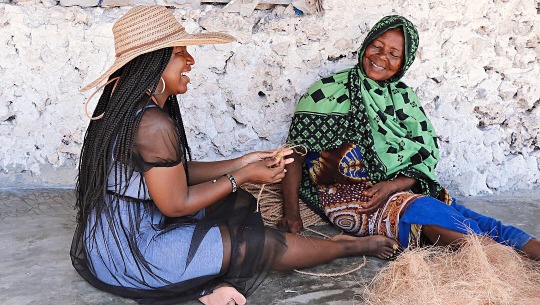
My Trip
Starting off from Stone Town
If I could describe Zanzibar to someone it would be that it is not like what I have seen on TV or in magazines, it was is so much more than I expected it to be. Every little detail in Stone Town was beautiful. The name Stone Town says it all, it gets its name from the ornate houses built with local stone by Arab traders and slavers during the 19th Century.

When I travel I always look to see if a place is able to make me feel at home and that’s exactly how I felt when I arrived. From the moment I landed people were very welcoming, everyone smiles and greets you with a jolly Karibu which means welcome and I knew then and there that I was going to have a great time.
The airport is rather very small so don’t be surprised, just adapt. There are also various airport transfers that can take you to your destination. I made use of Bennito who came highly recommended on all the research sites when I was planning my trip. Noting that I had arrived in the evening I wanted to make use of a reliable and safe transfer so Bennito it was, you can find him on Instagram @zanzibardestination or WhatsApp him on +255 743 072 597 and he charges USD 12 to Stone Town which is a 40 minute drive from the airport.
Just a heads up, there are no traffic lights or stops in Zanzibar so people drive like maniacs however don’t worry too much about the driving because they know their roads so trust that you will be okay.
When I arrived at my hostel, I noticed how filled the streets of Stone Town were with many tourists from all corners of the world as well as its residents walking around and socialising. As I mentioned earlier I stayed at Ten to Ten hostel which was very welcoming. Since it is somewhat of a newly built accommodation everything was really clean which I liked and it was centred basically in an area that was safe, surrounded by a number of places to eat and attractions.
My Highlights of Stone town.
I explored Stone Town by myself and whenever I got lost people were always willing to direct me the right way. I visited the Secret Garden at Emerson spice tea house where I had lunch and I was taken on a free tour of the hotel itself. It’s always good to ask if this can been done because you never know what you can score for free.

I also took a walk to Forodhani Garden which was a minute away from my accommodation. Basically this is a food market near a waterfront and every day just before sunset young teenage boys gather at the water front and jump off into the water to cool themselves.

I then also went to Darajani Market and the local fish market which was a free activity as welll. Along the way I stumbled upon Jaws corner, which is a corner where men usually meet every day to drink a cup of spice tea while discussing various life topics.
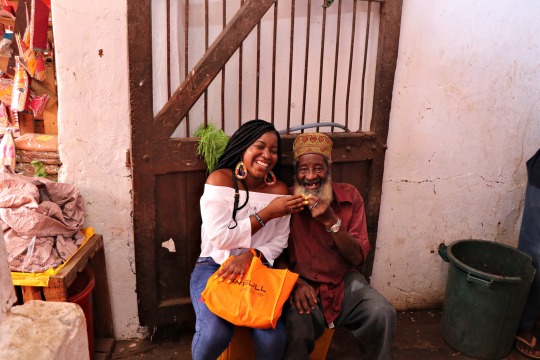


In addition I also went to a traditional spa called Mrembo Spa, where I chose a head, neck and back massage. This spa also helps Swahili females who are in the process of getting married prepare their bodies by clearing their skin to make it smoother before the big day. It also offers workshops where one can learn how to make incense sticks among other things. Mrembo spa can be found on Instagram @mrembospa or visit their website at www.mrembospa.com for their contact details.

Another discovery I came across was the House of Spices, which is a restaurant that till this day maintains its Arabic atmosphere and touring around the space was free.

All these places that I had gone too were located really near my hostel. It would take me about 7 minutes to get to each which was very convenient. And then off I was to the island of Jambiani.
Ending off in Jambiani
About sixty kilometres, southwest of Stone Town was where my island of choice Jambiani was situated. Why Jambiani, well I wanted to truly experience and live the Tanzania local life that is away from all the touristy stuff.

Jambiani is a very big village, it’s so big that it has been split into two parts and has two local chiefs that run each side of the village. The village is home to Muslims, Christians and Buddhists
Since it is a seaweed village local fisher men are usually seen in the early hours of the morning pushing out their boats for fishing as most of the residents from the village survive on sea food. They also make their income from this. In addition local women from the village assisted by their children also make a living from seaweed farming which is very common.


Arriving at my accommodation, Vanilla House I was welcomed with smiles and a fresh glass of mango juice before they had taken me to where I would sleep. On the very same day I found myself amidst a small intimate beach wedding that my place of accommodation was hosting where a polish couple eloped. This was amazing because it was my first time experiencing a beach wedding and now I am definitely left wanting to someday have a beach wedding of my own.
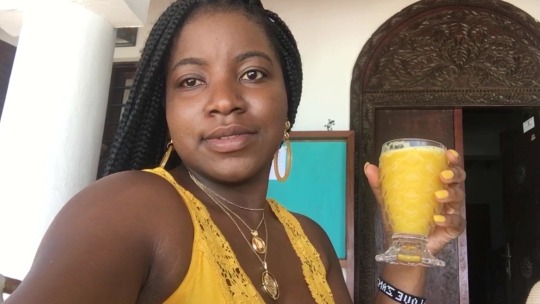
On the very same day which was a Friday, I also got the chance to attend another wedding but this one was much bigger. It was a local Muslim wedding and I had been informed Muslims usually celebrate their weddings on Fridays. Most of the people from the community gathered around in a circle and had a joyous dance off. Jambiani was truly just amazing.
During my time there I also awoke to the most beautiful sunrise I had ever seen while overlooking the soothing sound of the oceans waves.

Throughout the three days I spent on Jambiani I explored the beach this too was a free activity. I also took a bike ride that was offered by my accommodation for US 5 along the beach.
I as well had the opportunity to get on the local boats of Zanzibar called Dhow boats with a young man called Harry and is father. Although language was somewhat of a barrier Harry and I communicated pretty well as he knew a little bit of English.

All the meals I had throughout my stay were freshly prepared depending on whatever I wanted to eat and many restaurant on the beach were affordable as well.
There is so much I can say about both Stone Town and Jambiani but I would want you to experience it for yourself to see exactly what I mean by it is nothing short of amazing. I hope that this write up will help you plan your trip or any other trip in general that you might want to take.



1 note
·
View note